#the main reason why i started reading the book was because of the social phenomenon
Text
watching two dozen interviews of wes ball talk about how he made the maze runner movies is genuinely such a pleasure to watch. it's so so clear that he deeply loves the content of the maze runner books while still understanding that they're fucking insane and makes next to no sense. the vision he has for the movies are unparalleled, the way he slims down the books while still upping the character moments is so impressive!! he was able to capture the heart of the series while still making it really accessible to a general audience. it has a clear trilogy feel to it, which a lot of trilogies do NOT have. and the best part is the cast LOVES him, you can tell just by the way they describe and poke fun of wes that this project would NOT work without him. also the way the cast NEVER talks about dashner is so fucking good. they're like 'omg there's wes, the genius, doing a one man show haha so silly, ily wes' and then it hard cuts to someone being like 'james is on set a lot.'
#the main reason why i started reading the book was because of the social phenomenon#i mean when has there been a case where the movies are so much more beloved than the actual books????#half way through scorch. i understand now.#ONE SINGLE THING I WILL SAY THAT THE BOOKS DO BETTER#is minho#minho had a lot of LIFE in the books#he's arrogant#he's a bastard#and hes so funny actually#i love him in the movies too#ki hong lee is a great minho but its very very clear they chose newt over him to focus on#which is a real shame because theyre a trio for a reason yk#actually in general the books are actually hilarious#ALSO my theory is#wes ball was so charmed by TBS that he changed some shit around#my favorite interview of wes ball was him describing TBS' audition#saying how he was just so magnetic and he was immediately drawn to the idea of him about newt#WES BALL IS JUST LIKE ME FR#mine#maze runner#tmr#alex reads tmr
13 notes
·
View notes
Text
The ancient Greek philosophy references in the most beloved greek guy in Warhammer - Perturabo
So whilst I should have been spending my time preparing for my philosophy I`ve been thinking about Warhammer headcannons instead so here I am.
In his book there are several chapters where Perturabo`s life at Dammekos` is shown from different angels. From when he was young, his first actual duel with one of Dammekos` tyrant opponents subordinate to the moment when he starts conquering the Olympia. There is also shown clearly that he`s never been a ruler or a tyrant himself, he was general, man of art and science and… basically a court jester for his own family. So I`ve been thinking about one particular aspect of his possible life in such a state.
Since he used to indulge the public by having philosophical arguments with the people his “father” brought to him, they could have not been talking only about religious topics. There must`ve be plenty of things he was discussing with them. Dammekos told him once that he is proud of his son for being so good in dialectic and that he adored and cherished him the most because of how charismatically he spoke. The first person ever to even talk about such a thing as “dialectic” is Heraclitus from Ephesian school, ancient Greece. And Perturabo should`ve gotten quite particular knowledge about him personally because it`s not something general and basic such as understanding physical and mathematical phenomenon. He understood it too of course but it was knowledge implanted into his brain by the Emperor, he had no idea about the people who`ve invented this or that in the science, he just knew.
Following this there must be other things of Ancient Greece philosophy and mythology that Perturabo might have read about. He was famous for his loud denial of anything god-related and divine, a master of dialectics and in general he had quite interesting way of viewing things.
Back to Heraclitus, he told us that “Everything is changing all the time, there is nothing permanent since all the things are temporary. You can`t step in one river twice. The cold goes warmer, the warm freezes, the wet dries and the dry gets wet”. This is in particular might be the thing he was referencing to when he chose iron as his main heraldic item: iron never change when it`s forged right. If we take a sword for example (not the plow though) it might be heated to the white but if it`s made in a right way it will always come back to it`s original condition.
And so the continuous improvement was the way he wanted all his machinery and inventions to be like. Perturabo understood that there is nothing permanents and so as the world changes so must the things in this world change too, and every change is a sign of improvement in some way.
Perty must be a fan of Heraclitus lol.
Also, there was Xenophanes and his speeches about the absurdity of the Greeks` believes. He compared the faith in Gods to the same of animals “If horses and bulls had hands and we gave them brushes they would portray their gods as horse- and bull-like, with horns and hoofs”. Xenophanes and Heraclitus are both related closely to Ephesian school so they are considered a part of it.
You see? Perturabo was Ephesian scholar! In his own interesting ways but still, he refers to it`s philosophy a lot with his faith critique and even in his litany. Further here you will understand why I can`t call Perturabo an actual part of Ephesian school and the reason is not that it existed in like -1M.
The other part of his mind must be taken by sophists who were really into arguments thought didn`t really care about the rightness of the things they`ve told people. Protagoras taught his people the art of an argument, nowadays known as “rhetoric” at which as we all know Perturabo was actually pretty good. Sophism does not really has that significant of a matter since all they did was just switching attention from search for answers in nature towards humans` minds and social events though it still matters here since it just adds up to the thesis of Perturabo being an ideological sophist.
Aesthetic rationalism of Socrates. Long story short Socrates considered that the knowledge was it`s own reward and it`s own kindness. Of course knowing Perturabo`s character he would never be like Magnus who`s actually a better Socrates reference than our dear Greek boy, and so Perturabo would not think that sharing the “good and important knowledge” with people to help them get rid of ignorance to be a good idea.
Idealism of Plato. In the reference to Perturabo we can see that his main tragedy lies in his attempt to create “the perfect society”. “Your perfect houses for your perfect people”. He tried to explain humans as a machinery which is supposed to work properly with all it`s gears in their own places, with no such thing as “individual”. As failed Plato as failed Perturabo. The perfect society he wanted to build all his incredible project for would never exist.
…also the Little Horus Aximand`s name might somehow relate to Anaximander and Anaximenes but I do not know him as a character that much to find enough references sorry…
7 notes
·
View notes
Text
Headcanon: The Gundalian culture is based on individualism, the Neathian culture is based on collectivism
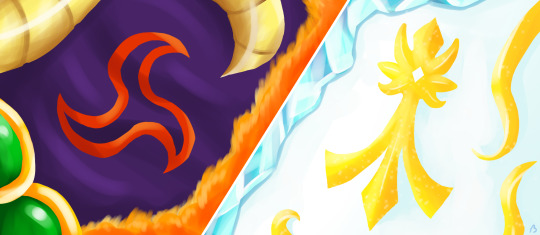
Race interpretation part one: Neathia
Summary: The Neathian culture is built on the core values of communities and collective thinking. While conformity within the society is of a high level, they pursue a 'closed gate' diplomacy towards other races - resulting in a 'bubble' phenomenon and becoming vulnerable to losing their sense of belonging. Centralised urban system, with regional reciprocity and redistribution, whereby the Queen plays a coordinator role, and exists as a unifying symbol along with the military.
(Wall-of-text warning ; with block-breaker illustrations, but a huge amount of information ahead.)
Okay, this topic is something I was thinking about for a long time, and I finally hit the point to collect my thoughts and write them down. I've seen a lot of people trying to build up/further and enrich the cultural and social-political features of the alien races we've seen in the series (namely Vestals, Neathians and Gundalians), and I felt some inspiration to put my take on these things into words.
It's not only intriguing to try one's hand on the world-further-building, but I felt, I have to explain how I imagine the build-up of the Neathian and Gundalian culture and society to make the story of the 'Neathian Special Squad' ('NSS') more understandable 'symbolically' and from the aspect of a 'cultural clash'. /For those, who follow the NSS: This is something that definitely happens later on, you just don't know about it yet./
I have to put a small disclaimer here: This entire piece of writing was conspired out of fun and passion towards the series. It was not meant to be a 100% professor approved scientific research, but a seemingly logical untangling of my personal train of thoughts concerning the fantasy creatures of the third season. And this means, there is going to be some personal opinion mixed in as well (especially at the rewriting parts).
I wish the readers to enjoy reading it regardless. You are always free to disagree or not to take it seriously. :) To me, headcanonizing and imagining things always meant to be fun.
Side note: I'll add canon elements as examples or refer to the events of Gundalian Invaders, although I have to admit, I'll do this mostly from memory. So If I get anything wrong, or just remember incorrectly, you are welcome to add-in or correct me! :)
Season: Bakugan: Gundalian Invaders (and Mechtanium Surge)
Language: English dub
Okay, let's go!
Gundalian Invaders - Slightly rewritten
The first and foremost reason I actually started writing this post, is because I had some issues with the characterisation of the Gundalians and Neathians in the third season. One side is depicted blatantly, purposelessly and one-dimensionally evil, while the other is portrayed to be the goodie-two-shoes victims with no backlashes. I wanted to swing over this simplicity and make an attempt at explaining, how I imagined these races to function. These interpretations were explored with the intention of both keeping the main features of the races, staying canon-compliant where possible, but change canon elements/propose ideas to turn the races into interesting (and on a theoretical level functioning) societies.
For these added or assumed ideas to work, some lore elements have to be changed or removed: For example the way Bakugan got to be on the planets. For this explanation see: a further point below.
This post discusses only Neathia for now. (Gundalia will probably get it's own post, as there is much more canon-divergence to be talked about.)
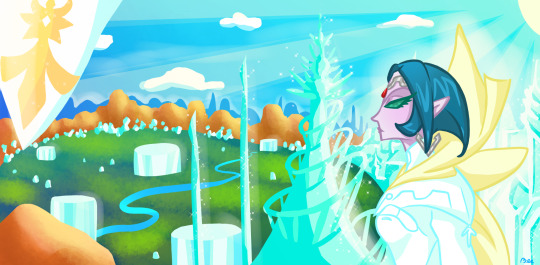
Neathians
1. The beginnings and core values
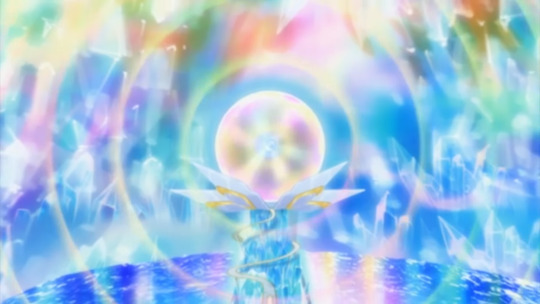
Due to the power of the Sacred Orb, almost the entire planet have relished in a lush fertility since the beginnings. (And this is why there are huge plants in their jungles. The wildlife also experienced a great upsurge by the life-force of the Orb.) This prosperity quickly enabled the Neathian race to organize into a peaceful and sharing society, because the wars over resources became redundant and unnecessary. The established racial mindset reallocated the focus from the individual needs to the communal efforts, and gives a ground for the Neathian values and collective thinking up to even the days of the season.
Neathians think mainly in groups: Let those be pairs (e.g. Fabia and Jin as fiancés; Linus and Neo Zipperator as brawling partners), teams (Neathian Special Squad; Friendship circles), communities (Castle Knights), and the biggest of them all, their entire race. These are all bigger or smaller communities within communities, and they play a major role in how Neathians perceive the world and themselves. Being in these relationship structures defines their place, grants them their basic mental frame, which they are able to think in, and not only their resources, but also their goals are shared with each other. This kind of goal assimilation is what makes them really efficient team players, and also provides them a strong social support from a mentalhygiene perspective. This important role of the sense of belonging makes Neathians both empowered while being in close social constructs , and extremely susceptible to losing these connections.

Thinking like this, when Fabia lost her fiancè or Linus lost Neo, their grief extended further than their deaths or the traumatic events. Losing strong bonds like these put Neathians in a technical identity crisis, as it is a part of their personal perception and mental frame which were dismantled through these events. We have seen Fabia going to extremes to retrieve Aranaut - and to retrieve that part of her, which was lost with Jin. Just as when Rubanoid was handed to Linus, a new connection was formed to either replace or continue the old one in a different form. Fabia's communal bonds were successfully restored, when she also became a member of the brawlers.
The Neathian society is based on caring and cooperation to achieve a collective well-being. This is why communities play such a major role in their self-perception and world-perception.
2. Open-sources, but enclosed diplomacy
For most part, I've always imagined the Neathian race as an although proud and generous, but closed society. They share commodities with each other - within their society -, but it is very important, that only within it. The outside world (meaning outside of their habited planet) is fundamentally shut out of these transactions.
I often refer to this phenomenon of enclosedeness as the 'Neathian bubble':
Not only their mindset operates in closed communities, but their diplomacy too. They are generally passive towards other races, missing trust and a reason to pick up the communication /Up until the Gundalians came and the war started/. This perspective could be applied to understand, why could they be more insistent on and better at operating defensive mechanisms (layered shield generator), than initiating communication with the rest of the universe (Unlike Gundalians, Neathians have no ships or bigger means of transportation. Yes, teleportation is accessible for them, but I don't think they use it that often outside of Neathia.)

I treat this as an explanation for why Neathia had only asked for outside help after the second shield generator went down - the situation became desperate and already being involved in the conflict, it was time to try and reach out for aid. According to these headcanons, I also think, Serena wasn't putting - or at least shouldn't have put - faith in the Brawlers so easily. The reason they weren't tested to prove their trustworthiness further than one question, is because she trusted Fabia's judgement. Without the support of a Neathian, outlanders are almost automatically dismissed. Their (or their Queen's) empathy and compassion may overwrite this code, but even by then they have to be made certain by proving the cause.

Just as when Fabia accepted Ren, because she had seen how much he tried to prove himself. Winning Neathians’ trust is supposed to be a big and determining moment, because they ‘internalise’ you into their scoiety.
Neathians are capable of empathy and kindness (this is something they actively practice among each other), even towards outsiders, they just need time and proof to accept them. Trust is just not automatic towards them, and even so they keep their distance until they get used to it.
3. Personal paralel counterparts - Night elves and the Highborne of WoW
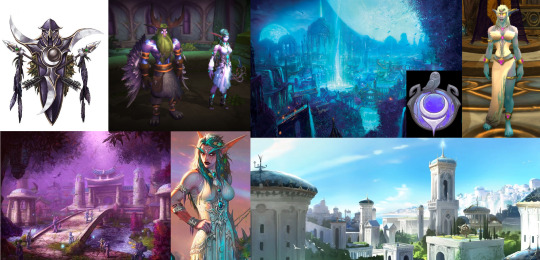
When I think about Neathians, I often put them into paralel with the Night elves and the Highborne from World of Warcraft. For most part, I use their artistic motives, architecture, fashion and cultural approach as an inspiration for Neathians, as they are recognised as 'The pretty space elves' in my book too.
Beside the above mentioned, what could be imported from their WoW counterparts is a rather matriarchal social apparat. For example, Neathians traditionally having a Queen, and women being present in the military or in higher positions, playing important roles. //Just as by the Night elves leadership, religious and military roles being traditionally occupied by women (priestesses, wardens, sentinels).//
Another elven impression, which is more or less universal, is their sense of pride (I like to say it as the expression of 'Neathian pride '). Highborne in World of Warcraft are a quite prestigious race and are usually said to be a little 'aristocratic'. I can imagine the Neathians being lightly less, but somewhat similar on these terms, when it comes down to interacting with their own or other races: For example being proud of their appearance (Emphasizing their unique V-shaped forehead with adequate clothing and accessories), structuring buildings and constructs based on aesthetic instead of real functionality (using diamond as the main material of construction, structuring buildings with elegant but futuristic shapes), or being confident and showing immovable standing and opinion on things (towards outsiders).
As far as I know, the Warcraft elves used to be similarly passive and uninitiative - even mistrusting - towards other races too. And in this, it played part, that they also had exclusive access to a powerful source of power and prosperity, the Well of Eternity (an almost one-on-one counterpart to the Sacred Orb).
While the half-tribal connections of the Night elves derive from their ancient bonds with nature and druidism, the Neathian society feels more likely being based on a futuristic envisionment of these social relations. A civilisation that perfectly blends technology (teleportation technology, communication devices) with classic fantasy elements (knights), while still remaining tribal in the core (shared communality is just put into a modern environment). /Although I like to lean more into the fantasy setting, the technical advancement is undeniable there./
4. Overall economy
If we wanted to negotiate about their economy, I would say reciprocity and localised redistribution are the dominant mechanisms of it. The basic definition of economy builds on the premise of distribution of scarce resources. In this case, resources are not scarce, in fact, due to the Orb they are very much prosperous and renewing. This accessibility discounts the value of the traditional market trading, and supports the establishment of semi-centralised recollection and redistribution. The semi-centralisation here means regional production and consumption, whereby the accomodation of the population happens mainly territorialy, but these regional centres still have a connection to each other and the capitol. This economy is based on caring and well-being, and the high level of conformity and trust within the collective society results in a lack of currency usage (so, my headcanon is basically, that they don't use money).
5. Urbanisation and territorial layout
The reason we talk about a more physical apsect of the planets, is because the core values of the races both play a role, and mutually affect how I imagine their civilised hubs being developed. Communities form hubs and cities with strong connections - just like their society!
When I mentioned localised redistribution, I was also refering to the urban structure of the Neathian planet. Important to note, that Neathia is not just a city, or a country - just like Gundalia, it's the entire planet. What we've seen in the show is the capital of their urban system - which makes sense to be technically built around / in the immediate enclosure of the Sacred Orb, for it's the source of the relishing power. Assuming this, along the capital there could be a centralised territorial layout with rural areas (cities, villages), and untouched wilderness (due to the overflourishing flora and fauna; the urbanisation doesn't affect the entirety of the planet, there are a lot of uninhabited/uncharted areas).

Here is a simple schematic illustration of the above.
The rural hubs not having physical connection with other centres due to the dangerous and untamable wilderness (see: Giant plants in the show) could have lead to the advancement of the teleportation technology. The cities are connected through this port-system, and also with the capital, which serves as the centre of the network.
6. The role of the queen and the military

The main purpose of the current Queen is an overall governance with the direct help of a council consisting of the local leaders of the hubs. The queen bears not only a political, but a symbolical importance to the people. The concept of the Queen is a unifying symbol, someone who watches over the nation. The Neathians can stand behind her and being represented by her. But it's important to note, that her status is not as glorified as to be a despotic being, and her power is not extending much further than overall policies, diplomatic representation and helping the transactions of the local leaderships. There is much more power and independence shifted into the regional governance, rendering the Queen's position to be an effective coordinator between them and unifier, who keeps the nation together. /Still thinking about the way the queen is chosen/comes to the throne, but I had the idea of the next Queen being elected by the current Queen, so the order of succession is not based on the Queen’s family, nor being a community vote of the people./
The peace-oriented existence in itself doesn't require a military to exists, therefore I treat the Castle Knights as a mainly defensive organisation. This military serves as Neathia's defenders, bearing symbolic and community building purposes. Among the Castle Knights - just as the name itself suggests - the traditional medieval knight values show up primarily, such as loyality, humility, courage, faithfulness and the act of mercy. In their comprehension, being a Castle Knight is an act of service towards their country and the Queen, and is not mainly for warfare reasons. (To some extent, I assume martial arts and other forms of fighting - even brawling - is essentially a spiritual activity, which they pursue in order to keep their inner- and physical balance.)
As we've seen it the show, I assume the Palace also functions as the military's operation base. The head of the military is the current commander (formerly Jin, recently Elright), and under them operate several divisions with captains as division leaders. The separate divisions are Physical Fighting (both with weapon, like those defensive shock-sticks the guards are using - formerly offensive melee weapons until the fall of NSS - and hand-to-hand combat, e.g. used by Fabia), Technical staff (operating the shield generators and overseeing their areas) and Bakugan Brawling (this headcanon part is still under construction, but Elright used to be the former leader of this, and the reason he was promoted to commander after Jin’s death, is because the Neathians' realisation of the war swinging in favor of the Bakugan fights, so it was logical to put him as the next 'general leader'). /There may be other divisions outside of these, I just put out some ideas here./ Every guard receives education to some extent in all of these fields, but they end up specialising in something.
//The Neathian Special Squad (NSS) had it’s own divison under Captain Pyrehart, they were a special strike team with a unusual task: Staggering, forcing back or just divide the Gundalian leadership’s attention from focusing on their assault. Basically poking them with melee weapons until they either go away, or can’t concentrate on helping their Bakugan on the field and their monsters get defeated. According to the story - made up by me of course - after a tragedic mission this unit wasn’t restored, and the war effort shifted onto long-range fighting with Bakugan, Gear and Bakugan Assaults.//
7. So...where are the Bakugan?

They have been mentioned here and there, but I'm sure, whoever made it this far into this theorising information dump, may wonder at this point: 'But what about the Bakugan?'
My simplest answer is, that I firmly want to believe, both Gundalia and Neathia had a civilised and established culture before the Bakugan appeared there.
According to the original lore, Bakugan existed on the planets since almost the beginnings. Now, this is part of those lore bits I would definitively change during a rewrite: I want to believe, Bakugan only appeared in their very recent history, almost as recently, as on Earth and Vestal itself.
Perhaps a Bakugan lore- and GI rewrite explanation deserved it's own post, but for the further understanding allow me to explain here a little: A similar event of raining cards - what the first season started with - occured on Neathia and Gundalia too, caused by the dimensional boom of Michael Gehabich and his transporter. The twist on this - and the effective solution to the problem of possible timeline inconsistencies - is that although the explosion caused this interference at one point in time, across cosmos and universes time flows differently. So technicaly the result of it - the raining cards and Bakugan being transported into the particular worlds - could happen at different point of their relative times - even years earlier or later! On Neathia and Gundalia it could happened a few years before on Earth, which covers most of the questions of the timeline-consistency /such as Ren being assigned to watch over Linehalt as a child etc./
Bakugan coming to these places has only an added effect: Just as on Earth, they are not (yet?) integrated into the society and culture of the planets so deeply to be any kind of pillar of their existence or basic civilisation. There could be a start (as having specialised researches, technology revolving around Bakugan, taking part in the war,..) regarding this internalisation process, but it still runs on the surface, and not in the 'veins' of the culture.
I hope this breakdown made sense in some form or another. I just felt an urge to pour out the content of my head. Looking back,this became longer and more detailed, than I originally intended, while also surely missing things because there is no worldbuilding without holes or further questions. The attempt to lay down the basics was made regardless haha!
As always, feel free to disagree and follow your own visions concerning the races and worldbuilding. :) This post was made to reflect back my personal interpretation of Neathians - just for fun and thinking out loud.
For the very end, I leave a disclamer here, which was supposed to go at the beginning, but it felt redundant to put there, so here it is:
I tried to approach it from a more sociological side, as focusing on a bigger, overall picture, common features, than create exact statements. (I would rather call this a speculation regarding the features of the races themselves, their core values, common attitudes, mindset - and this doesn't mean other questions are fully out of the picture. We are just discussing things, which can be derived from the features of the society itself, and make up a more or less coherent chain of thought for now. Other 'for fun' or miscellaneous headcanons, like fashion or physical traits will be covered another time.)
Thank you for coming to this TED mambling!
58 notes
·
View notes
Text
Let’s talk about the amazingly on spot social commentary on The Boys

Warning: This post contains spoilers from Season 1 and the first three episodes of season 2 of The Boys
Tags: @nehoymenyoy asked to be tagged. I don’t know if my tags are working well but if they don’t i will send you the link of the post.
I decided to make this post because i finished all the avaliable episodes of the series two days ago and, having a long talk with my sister about this topic, i tought this is too awesome to not discuss it here. We are both studying in careers of the social field, i'm in sociology and she is in social work. We watched the show together and talking with her inspired my own ideas i would like to share here.
This show was a wonderfull surprise in terms of social commentary. I haven't watched one with such a great commentary since American Gods. In that case i was expecting some degree of progressive commentary because i had read the book previously and i was aware the source material had some, the one added for the series is even better and it was great, but it wasn't a shock to find it. For The Boys i haven't read the comics first and , even when i loved the show for lots of reasons, the amazing on spot social commentary was a hell of a surprise. I have been frustrated lately in terms of the messages in entertaiment products because, even when there is a lot of intention for part of the makers to make more progressive points in their stuff, everything becomes bland marketing to me most of the time. I remember that some years ago media used to came out unintentionally with some really cool progressive messages ( like, for example, " a bug's life" and its anti capitalist message). That stuff seemed soo genuine and today i feel that everytime a product targets my demographic in that sense what they deliver it's soo bland and fake that the progressive intention of the message gets lost in the absolutely obvious intention of selling something to me using my ideals as catch. Precisely this is an important point of critic in this show. I didn't expected at all to get a genuine feeling in the social commentary of a superhero show. I'm not saying that this means i think the makers believe in this (after all, it's amazon), what i praise here is how good they did it. In a time when most productions claim to have a social commentary behind to come out as cool but result in shallow fake bullshit this series has provided me with something that feels autentic. Like American Gods, what i feel the show is trying to tell me actually gets me.
Before starting with the proper talk i want to dedicate a few línes to recommend a few scenes of the show i just mentioned. I was super dissapointed after finding out they will probably end up turning it into more bland fake bullshit for season 3 but, to anyone who likes well delivered social commentary, check on Orlando Jones's scenes as Anansi. He is my favourite character from the show and all his scenes are a blessing.
I would also want to clarify that this post and the opinions displayed on it are from an anti capitalist, intersectional feminist and latin american perspective. I know the show is very american, the issues it discusses are most of the time worlwide but it has particularities of the american context so i will try to talk only of what i feel i know enough to have a word. I'm argentinian and we have our local versions of some of this problems but i will stay in the series territory trying to be as faithfull as i can to the american reality it gets inspiration from. Also, forgive me for any mistakes on my writing and expresions. English is not my native language.
Superheros are modern mythology. How would this work in real life?
This is the basic premise of the show’s worldbuilding. The great thing is that this concept is not developed in an edgy, pretentious way. It is serious and painfully real because it’s not only a subversion of tropes, it says a lot of what superheros are to us as a modern times myth. In a superficial view, the world of The Boys feels like what the MCU could have become after the Sokovia accords if they would have been efficiently followed on a worldwide scale.
In that particular universe i use as reference, our superheros are noble and morally heroic individuals.State intervention is the factor threatening to corrupt their actions making them follow the interests of the system. The risk there, along with some very shady violations of human rights to powered people, is having superheros tied to something as unstable as political power. You can fear, for example, what a Trump-like president could do if he had power over the Avengers because, again, the heros are not corrupt, their line of command is. Now, if we strip away all the idealization we had putted on this bunch of powered persons and see them as what they truly are at the end of the day, people like everyone else. Why are we supposed to believe they are immune to corruption? If we also consider the phenomenon of strong privatization of security that has been growing worldwide . Wouldn’t they be more like security workers working for a private contractor? Less like heros and more like private military / security officers? Now, this is what we are talking about.
What feels so different from this show is that it assumes a surprisingly realistic point of view on a modern fantasy we are very used to consuming and still constructs a new power fantasy that empowers the viewer. I’ m saying this as an MCU fan, I had grown too comfortable with this optimistic fantasy and this twist from it is brilliant. To put some context on what i want to say here i will try to explain myself first on why i think that superhero fiction have this enormous popularity today and it has become such a huge thing in entertainment. Besides of the obvious reason of big companies producing big exciting action blockbusters for the genre, it’s curious to think on how much these stories gathered a lot of progressive audiences. In past decades action blockbusters didn’t felt progressive, today’s superhero blockbusters were embraced by progressive audiences and this was the start of a twist in general for the media. I think that there is a contextual social reason for this, not the only factor but one i feel is considerable.
Late Stage Capitalism crushed us, we are so used to injustice and the control the system has over us is so big that we have slowly stopped dreaming of changing it ourselves. Instead, the fantasy of a superhuman who has the power we don’t have saving us from oppression feels really comforting. Captain America becoming such a huge icon in the middle of a time where extreme facism is rising again all over the world, for example. I don’t know much about his comic counterpart but, at least from what i see in the movies, Steve’s ideals feel to me like all those aspects from French Revolution’s Enlightenment that capitalism dropped away once bourgeois defeated their feudal rivals and capitalism got consolidated, the freedom and equality that feudal lower classes fought for. Today, we feel too small to make a difference so we enjoy the fantasy of powerful persons leading the fight for us. Capitalism feels more unstoppable than ever, it is the only thing who seems strong to remain in a terribly chaotic world. The suffering this cruel system brings to this world is overwhelming, we feel only a miracle can save us now. This is what feeds the narrative of the superhero as modern myth and saviour of humanity.
The Boys tosses aside all our hopes and dreams, presenting us with the most realistic escenario. Superheros are not the miracle we are waiting for, they are humans like everyone else. They are not sacred entities existing beyond our societies, they are part of the system and they insert on it as part of the security industries. They can be corrupted and they work in corrupt institutions in benefit of the ruling class like every other security provider in capitalist societies. They become a new face of the security forces in constant tension with police and military because the myth of the superhero provides them with the public trust those other two forces lost. People lost their trust in cops but they trust sups because they are supposed to be this noble individuals mobilized by their personal feelings of injustice trying to make the world a better place … right? Police are the forces of the ruling class but superheros are supposed to be with us, or at least this is what common sense and propaganda claim, having our hopes as a base to work on.
For someone so used to the typical superhero fantasy this felt like a slap on my face back to reality. It soo accurate , the system tends to capture any revolutionary input and turn it into profit. Even if the sups could had been a revolutionary factor at the beginning, the most likely thing to happen is for them to become a profitable industry. If we add to this what we already know of the actions of police and military in our real world we have a combo for disaster. The realistic twist is so fresh and painfully real, i can totally see this happening in real life if superheros were a thing.
We have already introduced ourselves in the world of this story, let’s check on the first main character this series introduces to us. Hughie Campbell, a college age guy who works in an electronics store, lives with his dad and has the most boring average life you can imagine. This guy who is too afraid to ask his boss for a pay raise changes overnight when a superhero kills his girlfriend in front of him and the big corporation the asshole works for covers up the whole thing. The “average guy becomes a hero” trope is not new at all, but the use it has here feels fresh because it is not there only to feed the male geek power fantasy. Hughie is not a geeky average guy only so geeky average guys can identify with him in an action series full of geeky references,he is not there to be the nerdy guy from Robot Chicken. Hughie’s characterization makes a point for everyone. The smallest most unimportant person, the one who can't even stand up for themselves in everyday situations, can make a change. Remember Samwise Gamgee fighting Shelob in Lord of the Rings? Hughie killing Translucent gives me that vibe. If we consider the point i already stated about superheroes being there when we feel too small to fight back injustice, this is the exact opposite. This is a fantasy that gives us the power, makes us think in our own strengths. Hughie is standing up for himself for the first time in his life and he inspires us to fight for our rights.
Pharmaceutical,Security and Entertainment industries and their business system : Superheros as lab rats,elite security forces and celebrities.
This part of the post is the hardest to write and the most exquisite. There is so much to talk about about this system Vought shaped tying these three billionaire industries together. The first thing i want to mention, as a point to start, is Butcher’s ramble over the teddy bear with a camera inside in his meeting with Hughie. Perfect introduction for the character with a delightful moment of commentary. In our current societies people live in constant fear for hundreds of reasons. Fears over street crime had skyrocketed all over the world even when crime is not growing uniformly in every country and that accelerated the privatization of security, fears of parents over the strangers they leave they kids with when they are not home inspired products like the one mentioned in the series’s moment, fears on the effects of processed foods are an impulse for the diet industry and i could keep naming lots of other examples. Fears, and the emotional response they trigger , are the base of profitable businesses.
I had been reading some authors that describe this stage of capitalism as an emotional one. Capitalism preached science and rationality during the past century but today its base of support is an emotional one. To excite the sensations of the people as consumers, to eliminate rational criticism, to push anti popular agendas through emotional excitement and mass hysteria. To cite another example that you can consider bounded to the series, Right Realism in Criminology is now almost common sense and there are people who keep asking for harsher punitive systems. This ideology, with the help of media panic, goes straight after their feelings and fears of being victims of violent crimes. Rational thinking is not the area of discussion, the base of the argument is on fear and pain. Fear of being potential victims, pain shared with the victims thinking in solutions that sound more like revenge than justice.
Going back to my point, in the world of The Boys this type of punitivism seems to have succeeded even in a greater way than in our current world because it has superheros as backup. If real life harsh punitivism feeds on fear and a wish for social revenge, in this world it has the positive emotions supes inspire on people as a trust certificate for the persons who may not feel that way. They are loved and worshipped celebrities, their faces are everywhere, they have thousands of fans… who would see flaws in what they do? Can you imagine a world in which we worshipped cops and soldiers like we worship celebrities? This is it, people put their blind faith in them because most of them seem to be their fans. Even the people who are against brutality in the actions of security forces would end up trusting them because they are famous people. Our culture has taught us to make ourselves blind to the bullshit we see on the celebrities we love. Fans have a strong emotional attachment to their favourite celebs and this can turn into emotional manipulation in this context. If actors or singers in real life can have a fanbase that forgets to see them as human people how would these actual superhumans not end up being worshipped as gods?
There has always been military propaganda in entertainment but this marriage between the industries through superheros is far more sinister than that. It makes you think about the unfair amount of credibility we put in celebrities. The plane crash scene of Homelander and Maeve it’s even more devastating looking at it from that perspective. Those persons had their full trust in them and they were safer with the terrorists. Can you imagine being a Homelander fan and dying there? That’s horrible, the last thing you get in your life is the biggest disappointment ever from someone you trusted and stanned.
Speaking of Homelander, he is a right wing wet dream and one of the best villians i had ever seen, he makes me feel sick with how fucking despicable he is. His character is an excellent point to start the ramble on the third wheel of this corporate nightmare. Superheros are products of the pharmaceutical industry, injected with a drug since they were babies. In his particular case, he was raised like a lab rat and the series is realistic even in this detail. The lab rat kid with superpowers is another common trope that we see pretty often and here it also gets twisted. I’m thinking for example on Eleven from Stranger Things, she has been raised by abusive scientists who treated her as an experiment, yet she is this sweet kiddo who has a hard time socializing. Instead, Homelander is a monster without conscience or mercy and seems to be severely affected by his abnormal childhood. Brilliant, he is the ultimate product of this corporative triangle and depicts everything that's wrong with it.
The cycle is pretty clear: drugs create them, they play their role in security and their media notoriety justifies their actions. As it is shown in season one, the security aspect of the corporate complex represented mostly in Homelander’s actions craves to grow bigger and get supes into the military since, in the startpoint of the series, they only work with cops. Since the industry feeds on fear and Vought seems to have a monopoly in the production of powered persons there were no threats big enough to justify the intervention of superhumans in wars. Dismissing the importance of this monopoly for the company, Homelander suministrates the drug to terrorist groups in an attempt to create the first super villains. This is a perfect analogy of how the american war machine works. There is no way for terrorist groups from Third World countries to get access to sophisticated war technology without help from the ones who wield that power better than anyone. The first mentions of the supe terrorists reminded me of when i was in my course of worldwide history in college and i learned there how most of those famous names in middle eastern terrorism were actually friends with the CIA before at some point. Here in South America we have other history regarding the style of USA intervention, the Plan Condor dictatorships in the 70’s and early 80’s. I was just starting my career when I had a month of history classes about the Middle East and, being pretty ignorant on the matter, it shocked me the way in which the US villainized people they used to work with. I think the series makes a great point with this part of the plot because it hints something of this war mechanics.
Gender politics of the series: a surprisingly complex approach on the topic of sexual assault ,a realistic critic to bland white feminism and the empty cashgrabbing ways in which mainstream media adapts feminist discourse.
This topic was even a bigger surprise for me. I wasn't expecting such an interesting approach of gender issues, mostly because this is the area in which media wannabe woke messages had become more dissapointing to me lately. Specially in a show about superheros, i wasn't expecting to get very interesting points.
I will start talking of the portrayals of sexual assault. We have two sexually assaulted characters in the series, Starlight and Becca. First, i think it is great that they didn't used the "rape as character development" trope. Actually, it's cool how they mock this conceptions. When Starlight saves a woman from being raped on the streets or when she makes a public statement about her sexual assault it's the people behind her, building her public image as a character, the ones who push that trope. In the first time their great character development idea is to sexualize her outfit, after the second event mentioned they literally push her sexual assault as development. I love how the public relationships team acts oftenly in a men writing women way, serving as mirror for the most common mistakes of writers on pop culture products when they write female characters.
Going back to my point, i like the effort they putted into portraying differences in both cases. Homelander is the typical portrayal of a rapist, a narcisistic monster without remorse, a deranged son of a bitch. The Deep is also a piece of shit, but of a different kind. There is a phrase that feminists of my country had popularized " los violadores son hijos sanos del patriarcado" ( it means, the rapists are healthy sons of the patriarchy. It tries to explain they are not crazy individuals who act outside societal circunstancies), the Deep reminded me of that.
He is not crazy, he is an insecure guy with a super fragile ego who abuses women for power. Insecurity on men under patriarchy tends to become bashing of women. This is not a black and white portrayal of a sex criminal, it is surprisingly complex. Of course,his actions were unexcusable. He will never repay what he did to Starlight and other women before her but he has chances of working on his issues and, eventually if he trully wants to get better, stop being the scumbag he is. He is not a deranged criminal whose only fate is to be neutralized for the safety of others.
I think this is important because, at least in my country, i had seen people using sex offenders as an example of why countries without death penalty should implement it. I don't support extreme autoritarian security measures and it makes me sick to hear that there are people claiming those as solutions in the name of women's safety. I like the approach they took to portray The Deep as the piece of shit he is but still showing the complexity of this issue instead of going for a more traditional dichotomic way.
Back to the mocking of mainstream media's attempts of adopting a feminist approach i mentioned, the season two got even better at this commentary on the "Strong Female Character" trope with the introduction of Stormfront. She is the literal embodiment of what shitty marketing says an empowered female character must be and has the biggest "I'm not like other girls" complex ever. That interaction she had with Starlight in "pink = bad, pants = cool" mood was super annoying and blaming her for the assault?? Freaking disgusting.
Honestly, i hated her soo much even before she showed her true colours completely. Stormfront represents everything i hate in Hollywood's feminism and the crappy meaningless messages it's pushing lately. She reminds me to all the fake "woke" advertisements i had seen on tv, like a Carefree (pads brand) advertisement that pissed me off last week because with the slogan " self trust is beauty" it portrayed girls who wear make up as fake and insecure.
Now, speaking of that particular scene of her killing Kimiko's brother. I felt literally sick, even sicker than in every Homelander scene. This bitch is worst than Homelander because at least he gathers a public that serves to his views. If you ever need to provide someone with a proof of why intersectionality in feminism matters use this racist bitch. Horryfying racism hidden behind the progressive mask of a bullshit privileged version of feminism, the thing i hate the most. She has a strong nazi terf vibe. I think she absolutely applies as mirror of critic to stuff like Rowling's terf nonsense.
The introspective look this series has regarding the multiple issues on today’s attempts of gender approach on media entertainment surprised me. It’s everything i would had wished something to point out but nobody seemed to have the guts to make it happen because, as i already said, the current trend is what it’s being focus of critic here.
I will end this now, i feel there is plenty of more stuff to talk about but this post is getting very long and, if i get more ideas i want to discuss, i can always make a second post. As i said before, this expresses my humble opinions and i’m open to hear different interpretations that can enrich my views.
Thanks for reading this extra long ramble.
#my weird rambles#The Boys#Amazon The Boys#writing#rambles#social commentary#media portrayals#tv tropes#superhero cliches#tropes subvertion#Hughie Campbell#Billy Butcher#Frenchie#Kimiko#Mother's Milk#The Seven#Starlight#Queen Maeve#Homelander#The Deep#Stormfront#The Boys Season 1#The Boys Season 2
148 notes
·
View notes
Note
I want to hear about gay knights. Please.
Ahaha. So this is me finally getting, post-holiday, to the subject that was immediately clamoured for, when I volunteered to discuss the historical accuracy of gay knights if someone requested it. It reminds me somewhat of when my venerable colleague @oldshrewsburyian volunteered to discuss lesbian nuns, and was immediately deluged by requests to do just that. In my opinion, gay knights and lesbian nuns are the mlm/wlw solidarity of the Middle Ages, even if the tedious constructionists would like to remind us that we can’t exactly use those terms for them. It also forces us to consider the construction of modern heterosexuality, our erroneous notions of it as hegemonically transhistorical, and the fact that behaviour we would consider “queer” (and therefore implicitly outside mainstream society) was not just mainstream, but central, valorized, and crucial to constructions of medieval manhood, if not without existential anxieties of its own. Because medieval societies were often organized around the chivalric class, i.e. the king and his knights, his ability to make war, and the cultural prestige and homosocial bonds of his retinue, if you were a knight, you were (increasingly as the medieval era went on) probably a person of some status. You had a consequential role to play in this world, and your identity was the subject of legal, literary, cultural, social, religious, and other influences. And a lot of that was also, let’s face it, what the 21st century would consider Kinda Gay.
The central bond in society, the glue that made it work, was the relationships between soldiers, battlefield brotherhoods, and the intense, self-sacrifical love for the other that is familiar to anyone who has ever watched a war movie, and dates back (in explicitly gay form, at least) to the Sacred Band of Thebes. Medieval society had a careful and contested interaction with this ideal and this kind of relationship between men. Because they needed it for the successful prosecution of military ventures, they held it up as the best kind of love, to which the love of a woman could never entirely aspire, but that also ran the risk of the possibility of it turning (homo)sexual. Same-sex sexual activity was well-known in the Middle Ages, the end, full stop. The use of penitentials, or confessors’ handbooks, as sources for views or practices of queer sexual behaviour has been criticised (you will swiftly find that almost EVERYTHING used as a source for queer history is criticised, shockingly), but there remains the fact that Burchard of Worms’ 11th-century Decretum, a vast compilation of canon law, mentions same-sex behaviour among its list of sins, but assigns it a comparatively light penance. (I don’t have the actual passage handy, but it’s a certain amount of days of fasting on bread and water.) It assigns much heavier penalties for Burchard’s main concern, which was sorcery and the practice of un-Christian beliefs, rituals, or other persistent holdovers from paganism. This is not to say that homosexuality was accepted, per se, but it was known about, it must have happened enough for priests to list in their handbooks of sins, and it wasn’t The End of The World. Frankly, I am tired of having to argue that queer people existed and engaged in queer activity in the Middle Ages (not directed at you, but in general). Of course they did. Obviously they did. Moving on!
Anyway. Returning to gay knights specifically, the fact remained that if you encouraged two dudes to love each other beyond all other bonds, they might, you know, actually bang. This was worrisome, especially in the twelfth century, as explored by Matthew Kuefler, ‘Male Friendship and the Suspicion of Sodomy in Twelfth-Century France’ and Ruth Mazo Karras, ‘Knighthood, Compulsory Heterosexuality, and Sodomy’ in The Boswell Thesis: Essays on Christianity, Social Tolerance, and Homosexuality, ed. Matthew Kuefler (Chicago; University of Chicago Press, 2006), pp. 179-214 and 273-86. I have written a couple papers (in the ever-tedious process of one day being turned into journal articles) on the subject of the Extremely Queer Richard the Lionheart, some material of which can be found in my tag for him. Richard’s queerness has been argued over for a long time, we all throw rotten banana peels at John Gillingham who took it upon himself to deny, ignore, or minimize all the evidence, but anyway. Richard was a very masculine and powerful man and formidably talented soldier who could not be reduced to the stereotype of the effeminate, weak, or impotent sodomite, and the fact that he was a prince, a duke, and a king was probably why he was repeatedly able to get away with it. But he wasn’t alone, and he wasn’t the only one. He was very much part of his culture and time, even if he kept running into ecclesiastical reprisals for it. It happened. If you want a published discussion that covers some of my points (though not all of them), there is William E. Burgwinkle, ‘The Curious Case of Richard the Lionheart’, in Sodomy, Masculinity, and Law in Medieval Literature: France and England, 1050-1230 (Cambridge: Cambridge University Press, 2004), pp. 73–85. Also on the overall topic, Robert Mills, Seeing Sodomy in the Middle Ages (Chicago: University of Chicago Press, 2015).
Peter the Chanter, a Parisian cleric, also wrote De vitio sodomitico, a chapter of his Verbum abbreviatum, fulminating against “men with men, women with women [masculi cum masculis […] mulieres cum mulieribus]” which apparently happened far too often for his liking in twelfth-century Paris (along with cross-dressing and other genderqueer behaviour; the Latin version of this can be found in ‘Verbum Abbreviatum: De vitio sodomitico’ in Patrologia Latina, ed. Jacques-Paul Migne (Paris: 1855), vol. 205, pp. 333–35). Moving into the thirteenth and especially fourteenth centuries, this bond only grew in importance, and involved a new kind of anxiety. Richard Zeikowitz’s book, Homoeroticism and Chivalry: Discourses of Male Same-Sex Desire in the 14th Century (New York: Palgrave Macmillan, 2003), explores this discourse in detail, and points out that the intensely homoerotic element of chivalry was deeply embedded in medieval culture – and that this was something that was not queer, i.e. unusual, to them. It is modern audiences who see this behaviour as somehow contravening our expected stereotypes of medieval knights as Ultra Manly No Homo Men. When we label this “medieval queerness,” we are also making a judgment about our own expectations, and the way in which we ourselves have normalized one narrow and rigid view of masculinity.
England then had two queer kings in the 14th century, Edward II and Richard II, both of whom ended up deposed. These were for other political reasons, but their queerness was not irrelevant to assessments of their character and the reactions of their contemporaries. Sylvia Federico (‘Queer Times: Richard II in the Poems and Chronicles of Late Fourteenth-Century England’, Medium Aevum 79 (2010), 25–46) has studied the corpus of queer-coded historical writing around Richard, and noted that while the Lancastrian propaganda postdating the usurpation of Henry IV in 1399 obviously had an intent to cast his predecessor in as unfit a light as possible, the accusations of queerness started during Richard’s reign, “well before any real practical design on the throne […] and well before the famous lapse into tyranny that characterized the reign’s last few years. In poems and chronicles produced from the mid-1380s to the early 1390s, and in language that is highly charged with homophobic references, Richard II is marked as unfit to rule”. E. Amanda McVitty (‘False Knights and True Men: Contesting Chivalric Masculinity in English Treason Trials, 1388–1415,’ Journal of Medieval History 40 (2014), 458–77) examined how the treason trials of high-status individuals centred on a symbolic deconstruction of his chivalric manhood, demoting and exiling him from the intricate homosocial networks that governed the creation and performance of medieval masculinity.
This appears to have been a fairly extensive phenomenon, and one not confined to the geopolitical space of England. Henric Bagerius and Christine Ekholst (‘Kings and Favourites: Politics and Sexuality in Late Medieval Europe’, Journal of Medieval History 43 (2017), 298–319) traced the use of ‘discursive sodomy’ as a rhetorical tool employed against five late medieval monarchs, including Richard II and his great-grandfather Edward II, John II and Henry IV of Castile, and Magnus Eriksson of Sweden. In all cases, the ruler in question was viewed as emotionally and possibly sexually dependent on another man, subject to his evil counsels and treacherous wiles, and this reflected a communal anxiety that the body of the king himself – and thus the body politic – had been unacceptably queered. Nonetheless, as a divinely anointed figure and the head of state, the accusations of gender displacement or suspected sodomy could not be placed directly on the king, and were instead deflected onto the favourites themselves, generally characterised as greedy, grasping men of ignoble birth, who subverted both social and sexual order by their domination of the supposedly passive king.
None of this polemic produced by hostile sources can be read as direct confirmation of the private and physical actions of the kings behind closed doors, but in a sense, this is immaterial. The intimate lives of presumably heterosexual individuals are constructed on the same standards of evidence and to much greater certainty. In other words, queerness and queer/gay favourites could not have functioned as a textual metaphor or charged accusation if there was not some understanding of it as a lived behaviour. After all, if the practice did not physically exist or was not considered as a potential reality, there could have been no anxieties around the possibility of its improper prosecution.
This leads us nicely into the deeply vexed question of adelphopoiesis, or the “brother-making” ceremony argued by some, including John Boswell, as a medieval form of gay marriage. (Boswell, who died of AIDS in 1994, published the landmark Christianity, Social Tolerance, and Homosexuality in 1980, and among other things, controversially argued that the medieval Catholic church was a vehicle for social acceptance of gay people.) Boswell’s critics have fiercely attacked this stance, claiming that the ceremony was only intended to join two men together in a celibate sibling-like relationship. A Straight Historian who participated in a modern version of the ceremony in 1985 actually argued that since she had no sexual inclinations or motives in taking part, clearly it was never used for that purpose by medieval men either. (Pause for sighing.)
The problem is: we can’t argue intentions or private actions either way. We can understand what the idealized and legal designation for the ceremony was intended to be, but we cannot then outrageously claim that every historical individual who took part in it did so for the party line reason. Maybe medieval men who joined together in brother-making ceremonies did live a celibate and saintly life (this would not be surprising). It seems ludicrous to argue, however, that none of them were romantically in love with each other, or that they never ever ever had sex, because surprise, formulaic documents and institutional guidelines cannot tell us anything about the actions of real individuals making complex choices. Even if this was not always a homosexual institution (and once again with the dangerous practice of equivocating queerness with explicitly practiced and “provable” sexual behaviour), it was beyond all reasonable doubt a homoromantic one, and one sanctioned and organised according to well-known medieval conventions, desires (for two men to live together and love each other above all) and anxieties (that they might then have sex).
The medieval men who took a ‘brother’ would probably not have seen it as a marriage, or as the kind of household formation or social contract implied in a heterosexual union, but as we have also discussed, the definition of marriage in the Middle Ages was under constant contestation anyway. The church was constantly anxious about knights: their violence, their (oftentimes) lack of religiosity, their proclivity for tournaments, swearing, drinking, and other immoral behaviour, the possibility of them having sexual affairs with each other and/or with women (though Andreas Capellanus, in De amore, wrote an entire spectacularly misogynistic handbook about how to have the right kind of love affair with a woman and dismissed same-sex relationships in one sentence as gross and unworthy, so he was clearly the No Homo Bro Knight of his day). So, as this has gotten long: gay knights were basically one of the central social, religious, and cultural concerns of the entire Middle Ages, due to their position in society, their necessity in a warlike culture, the social influence of chivalry and their tendency to bad behaviour, their perceived influence over the king (who they may also have given their Gay Cooties), their disregard of the church’s teachings, and the ever-present possibility that their love wasn’t celibate. So yes. Gay knights: Hella Historically Accurate.
The end.
#history#medieval history#queer history#gay knights#long post#i have a lot more to say but yes#the old guard meta#for reference#though this post was originally written in december 2019#anonymous#ask
1K notes
·
View notes
Text
Transmedia Storytelling: A Perspective on the Homestuck Epilogues
First of all, thank you for reading my first post! I created this blog to document some of my research for a directed study project. I’ll be looking at Homestuck from an interdisciplinary lens but focusing especially on its formal artistic qualities and place in art history. The blog will contain various points of analysis which I develop over the course of the project. For my first piece of writing, I wanted to tackle (from a new perspective) what I view as a complicating factor in the controversy surrounding the Homestuck Epilogues.
Rather than critiquing the Epilogues’ content or making a judgement about their overall quality, I want to explore a specific criticism which has been echoed time and time again by fans. In an article for the online journal WWAC, Homestuck fan-writer Masha Zhdanova sums up this criticism:
“No matter how much members of the creative team insist that their extension to the Homestuck line of work is no more official than fanwork, if it’s hosted on Homestuck.com, promoted by Homestuck’s official social media accounts, and endorsed by the original creator, I think it’s a little more official than a fanfic with thirty hits on AO3.”
Between attacks on the Epilogues’ themes, treatment of characters, and even prose-quality, fans have frequently referenced the issue of endorsement and canonicity as summarized above. Although the Epilogues and Homestuck’s other successors (including Homestuck^2 and the Friendsims) attempt to tackle themes of canonicity within their narratives, critics of the Epilogues contend that this philosophical provocation falls flat. While the creators argue that the works should form a venue for productively questioning canonicity, fans point to issues of capital and call the works disingenuous. In Episode 52 of the Perfectly Generic Podcast Andrew Hussie explains that, to him, the Epilogues are “heavily implied to be a piece of bridge-media, which is clearly detached from the previous narrative, and conceptually ‘optional’ by its presentation, which allows it to also function as an off-ramp for those inclined to believe the first seven acts of Homestuck were perfectly sufficient.” As Zhdanova paraphrases, a critical view posits that this “optional” reading is impossible. The company ethos and production of capital inherent to the Epilogue’s release—their promotion, their monetization—renders their “fanfic” backdrop completely moot, if not insulting.
Why does appropriating the “aesthetic trappings” [1] of AO3 strike such a chord with critics, though? What’s wrong with the Epilogue creators profiting from their work? Other officially endorsed “post-canon” materials, including the Paradox Space comics, Hiveswap and Friendsim games, have not inspired such virulent opposition. The issue comes down to the association between the AO3 layout and the separation from canon. The Epilogues ask us to read them as “tales of dubious authenticity,” but critics assert that this reading makes no sense in the context of their distribution. It’s not exactly the endorsement or monetization that prevents a “dubious” reading, though. After all, Hiveswap is also endorsed and monetized, yet fans have no problem labeling it as “dubiously canon.” So what is it about the Epilogues’ presentation that seems so incongruous with their premise as “dubious” texts?
I’ve come to understand this issue through the lens of transmedia storytelling. First conceptualized by Henry Jenkins, “transmedia storytelling” involves the production of distinct stories, contained within the same universe, across different media platforms. [2] This allows consumers to pick and choose stories across their favorite media outlets, since each story is self-contained, but superfans can still consume All The Content for a greater experience. The Marvel franchise with its comics, movies, TV shows, and other ephemera, is a great example of the transmedia phenomenon.
How does Homestuck fit into this theory? In an excellent article [3] for the Convergence journal, Kevin Veale lays out a taxonomy for Homestuck’s role in new media frameworks. Rather than dispersing different stories across multiple media platforms, Homestuck combines the “aesthetic trappings” of many media forms into one massive outlet: the Homestuck website [4]. It’s almost like the inverse of transmedia storytelling. Veale describes this type of storytelling as “transmodal.” He further defines Homestuck’s storytelling as “metamedia,” meaning that it manipulates the reader’s expectations of certain media forms to change the reading experience. So, despite its multimedia aspects, Homestuck structures itself around one monolith distribution channel (the website), the importance of which directly feeds into what we know as “upd8 culture.” The Homestuck website itself, as a “frame” which encapsulates Homestuck and the other MS Paint Adventures, takes on a nostalgic quality; the familiar grey background and adblocks become inextricably linked with the production of the main, “canon” narrative.
Homestuck itself—the main narrative—is a transmodal venture. However, as of writing this post, the Homestuck franchise has taken a leap into transmedia waters, starting with the Paradox Space comics and continuing with Hiveswap, the Friendsims, and Homestuck^2. All four of these examples fit the definition of transmedia ventures: they contain distinct stories still set in the Homestuck universe and are distributed through fundamentally separate media channels from the main comic. Which is to say, crucially, none of them are hosted on the Homestuck website.
This is where I think the issue arises for the Epilogues. The Epilogues, from what I can tell, aimed to present themselves as a transmedia venture rather than a transmodal one. Firstly, they try to act as a “bridge-media,” or self-contained story. They can be read as a continuation of Homestuck, but can also be separated or ignored. Secondly, they take on a distinct format (prose). Hussie notes in PGP Ep. 52 that the Epilogues were originally only meant to be published in print, functioning as a “cursed tome.” In short, they were intended as a transmedia venture: a self contained story, distributed through a separate medium (prose) and separate media channel (print), to be embraced or discarded by consumers at their whim.
Instead, when the Epilogues were released through the main Homestuck website, readers couldn’t help but interpret them as part of Homestuck’s long transmodal history. Rather than interacting with a new distribution channel, readers returned to the same nostalgic old grey website. The AO3 formatting gag makes no real difference to readers, as Homestuck patently appropriates the aesthetics of other platforms all throughout its main narrative. This issue of distribution (print versus website), which in turn produces either a transmedia or transmodal reading, is the crux of the criticism I mentioned before. Despite the creators’ protests, readers failed to see any “question” of canonicity because the Epilogues fit perfectly into the comic’s preexisting transmodal framework, supported even further by the nostalgia of the website’s very layout. The Epilogues read as a transmodal contribution to Homestuck’s main channel rather than a post-canon, transmedia narrative (like Paradox Space or the Friendsims) as they were intended. This created a profound dissonance between the fans’ experiences and the creators’ intentions.
How things might have turned out differently if the Epilogues really had been released solely as “cursed tomes,” the world will never know. In PGP, Hussie cites the importance of making content freely accessible on the website as a reason for the online release, which is certainly a valid consideration. Even though the print format offers a much clearer conceptual standpoint as a transmedia “bridge-story” [5], issues of capital and accessibility may still have come to the forefront of discussion. As it stands, though, I think the mix-up between transmedia and transmodal distribution was a key factor in the harsh criticism the Epilogues sparked.
------------------------------------------------------------------------
If you liked this post, you can follow the blog on tumblr for updates or, if you don’t frequent tumblr, sign up for the mailing list to receive an email whenever I publish a new mini-essay!
------------------------------------------------------------------------
[1] I love this term, “aesthetic trappings”, which Masha Zhdanova uses, so I’ve overused it to some degree in my post.
[2] Henry Jenkins, Convergence Culture: Where Old and New Media Collide, 2007: pg. 98. You can also find a description of transmedia storytelling on his blog.
[3] Veale, Kevin. “‘Friendship Isn’t an Emotion Fucknuts’: Manipulating Affective Materiality to Shape the Experience of Homestuck’s Story.” Convergence: The International Journal of Research into New Media Technologies 25, no. 5–6 (December 2019): 1027–43. https://doi.org/10.1177/1354856517714954.
[4] Although the Homestuck website shifted branding from mspaintadventures.com to homestuck.com before the Epilogues’ release and has shifted its aesthetic somewhat (re: banners and ads), I treat the core “website” as the same location in my post
[5] Hussie points to numerous fascinating experiences which might have arisen from the print distribution. He describes a tome as “something which maddeningly beckons, due to whatever insanity it surely contains, but also something which causes feelings of trepidation” and references the sheer size of the book and “stark presentation of the black and white covers” as elements which produce this trepidation. The ability to physically experience (through touch) the length of the Epilogues and the impact of the book cover were lost in the online format. Although the Epilogues have been released in their intended book format now, the printed novel still won’t be a “first reading experience” for most fans.
28 notes
·
View notes
Link
I Don’t Read Comments From Men
It’s just not worth it.
M. K. Fain
Oct 15
· 5 min read

Let’s just get this out of the way: I hate social media. There’s no hiding it. Despite the fact that I actually run a social media site, I truly despise it. Nothing gives me more anxiety than social media, and cutting it (mostly) out of my life has been a huge part of managing my anxiety.
I’ve come up with a view tricks over the years to manage the anxiety of the limited social media I still use, one of them being my Stop, Drop, and Roll method:
Stop reading comments
Drop your content
Roll out and move on
Of course, sometimes I do actually want to read the comments. For example, I write a lot about feminist issues involving male violence, sexual assault, and domestic violence. When I put a vulnerable piece out there, I often appreciate reading the comments from women who share harrowing stories about their own experiences. Hearing other women’s experiences is important to me.
Sometimes, I’m curious about the conversation my work has started and I’m interested if I can learn anything new from the ideas in the comments. Occasionally, someone will actually change my mind with a well educated and cited comment. I deeply appreciate the people who take the time to do that, and I don’t want to miss those learning moments.
But, even when I break my “don’t read the comments rule,” I have had to set another boundary with myself to keep my sanity: Never read comments from men. Ever.
Any time I break this rule, I instantly regret it. Men never fail to disappoint. There are three main reasons why I’ve found reading comments from men on social media to be a total waste of my time.
1. Men’s voices are overrepresented online anyways
Men already dominate nearly every public sphere — including the internet. A 2014 article in Quartz examined the sex biases of nearly 1 million comments on New York Times articles. Although women make up 44% of the readership of the Times, they only compromised 25% of comments.
There are many proposed reasons why this may be the case. Some have argued that women are bullied and harassed offline. Some say women are in the comments, they just chose to use pseudonyms for privacy. Others disagree, arguing that women chose to avoid the comments sections because they have better things to do than troll. Whatever the reason, the fact is the same: men are dominating the comments sections nearly everywhere.
This is no surprise. Women’s words are underrepresented in nearly every written form of communication. For example, despite the fact that women receive the majority of MFAs, the New York Times bestsellers list is still dominated by men (although it is improving over time). Books by male authors are disproportionately reviewed in every major publication by disproportionately male reviewers.

Men are more likely to be quoted in articles (at a ratio of 3:1), and men make up more about two-thirds of bylines in publications like The New York Times and The Washington Post. Even Wikipedia has a gender bias, with somewhere between 8.5% and 16% of Wikipedia editors being female. The phenomenon is so prevalence that is has even sparked its own meme: “There are no girls on the internet.”
Male voices are everywhere, and they have no trouble being heard. I read the opinion of probably hundreds of men all day online and, the truth is, I don’t need anymore. By refusing to read comments by men, I’m not blocking myself off from the male perspective. I’ll get that from plenty of other sources. Rather, I’m focusing on the perspectives of those who are more often silenced and ignored.
Read the rest on Medium
Support the author M. K. Fain
2K notes
·
View notes
Note
Okay so I’ve been meaning to ask for a while now but I was far too nervous and didn’t want to offend anyone. But, that being said, can I ask why you choose to indulge in RPF? I personally find it super strange, invasive and (maybe this is a stretch) but also low-key dehumanising?
Idk what word to use here and how to eloquently word this but definitely feels like RPF plays into the fetishisation and the ‘disconnect’ of celebrities from people who indulge in it. Like, by writing RPF you’re writing your own version of that person (some people try and stay accurate whilst others invent whole new personalities after) but you don’t know them, not entirely, and for writers to (understandably) fill in the gaps with whatever they like and create fics seems a little disrespectful and voyeuristic, esp because you’re using very real people to fill in the majority of the sexy (or just generally desired) ‘character bar’ whilst headcanoning the rest and publishing it.
Idk, I personally find it kinda disrespectful as to how real human beings are just used almost as props to serve and fulfill a handful of people’s fantasies/desires. At least with fictional characters, it’s not that big a deal if you headcanon, fill in the personality gaps or go ooc because they are fictional. But for RPF, the real people are often treated as jumping off points for whatever build-a-bearfantasy writers have in mind (younger writers/readers are far more likely to do this but I believe it’s a widespread phenomenon amongst everyone who indulges in it)
And I know the people involved are likely never going to read it but it still doesn’t mean they haven’t been disregarded/disrespected as a person already. I’ve personally never liked RPF, writing or reading, but I know some people like it - I just don’t know why?? I know one argument I’ve heard is that celebs are in the public eye and so, they can rightfully be objectified/sexualised by their fanbase, which yes kinda makes sense but idk if it merits/justifies using the shell of the celebrity to fulfill the kinks of everyone in their fanbase.
I’m not sure how much sense I’ve made here. I’m pretty sure I’ve repeated myself the entire time lol but I am curious to what your answer would be. Full disclaimer - it is not my intention to shame you or anyone else - I just want to understand your thought process because it is wildly different to mine and for the most part I like/vibe with this blog a lot because your attitude towards celebs and celeb gossip is so refreshing. When I saw all the joshlie/swiftwyn fics I was a bit lost and further lost when people started actively thirsting, hence the reason behind this ask. Sorry this was so long ✌🏼
Okay so I have a lot of Thoughts™️ on this tbh. Now backstory: I was SUPER pearl clutchy about RPF for like actual years. I somehow missed the After phenomenon in terms of the books, but when the film deal came through I was properly scandalized. I was like, “Good grief imagine being Harry and you’re the basis for a whole ass abusive boyfriend character like what the actual fuck is wrong with these people!?” And then I did more thinking about it especially as I watched the sheer commercial success of this shitshow.
Now I’m very like theoretically anti capitalism but I’m also a very pragmatic person whose primary love is and always has been and always will be the entertainment industry so we do have to look at what makes money because this shit’s not charity. And what the runaway success of After taught me is... RPF makes money. Like BIG money.
So then I had to relax on the pearl clutching and start asking myself why that is. Why are people into this shit? Well, celebs market themselves as 1) a brand and 2) sexual beings. You’re supposed to want them. That’s how they’re being sold to you. Harry’s not posing fucking stark naked in the Fine Line insert art for his health. Taylor’s not posting National Sock Appreciation Day for you to appreciate her socks. Like these are sexual beings and they’re being marketed to us as sexual fantasy. That’s part of why we’re buying their shit.
Let’s go back to the ‘celebs market themselves as a brand’ - if you look at people inspiring RPF it’s hardly ever people who are like... freaky private. Nobody’s putting out Saoirse Ronan RPF because tbh the average person, even an average fan of hers, doesn’t really know anything about her. She avoids socials and she doesn’t take too much press and she sorta just does her thing. People like Harry and Taylor and tbh Karlie market their personalities. They’re selling a whole package - not just a talented professional, not just a hot person, but a whole ass person who you’re supposed to buy into while also being y’know turned on by them per my previous points.
So here we get into the RPF of it all. Realistically, these people are going to inspire fantasies. They’re trying to do that. And they’re also selling and marketing their relationships and personalities. Again, this is not an accident, this is a purposeful commercial push.
With that in mind, what’s so wrong about imagining scenarios that they’re kinda like... trying to concoct for us already? Taylor’s been singing about her sex life non stop since 2017. She’s told us these songs are about Joe. Joe’s a public figure who also takes interviews and markets his personality. Is it, therefore, wrong to imagine what that sex is like if they’re both hot and making money off of us? Is she not lowkey trying to get us to do that when she’s, like I say, singing about sex with him on main since 2017?
Now with RPF what we need to remember is this is purely fantasy. It isn’t real, and it’s not like... canon. I’m also not into like AU RPF personally like I don’t really have much imagination for like RPF crackships lmao but I’m also not going to get all huffy over it. For me, if celebrities sell shit using their relationship - as Taylor absolutely fucking does - and sell themselves as sexual and desirable - as Taylor absolutely fucking does - there’s nothing that wrong with fantasizing about what that is like.
It’s obviously not real. It shouldn’t be treated as real. But as an exercise in imagination, I don’t see what’s so wrong with it.
Also many of us have fantasies all the time even if we don’t write and publish them. We have sex dreams and weird fantasies about people we know/crushes and of course we fantasize about celebs. I think putting that down in formal words isn’t worth getting all up in arms about. I think it’s just having a bit of fun.
Finally, back to After: this is a HUGE commercial market. We can see that. And like I don’t see it as that unethical when I examine it closely because these people are also making money off of it. It’s like we can say “oh celeb gossip is so terrible” but it makes the people involved huge money. And considering at the end of the day entertainment shit does come down to the bottom line... ehhhh I’m okay with it.
Hope this kinda gives my take and it’s a conversation I’m very interested in so if y’all would like to keep having with takes and countertakes I’m all for it.
4 notes
·
View notes
Text
nobody asked but i think hanso, brynn, and xandra from neopets’ comic “the faeries’ ruin” are queer | a 1.8k presentation i am presenting to my friends at an online party on the 19th, but you guys get early access because for some godforsaken reason, you like this content from me
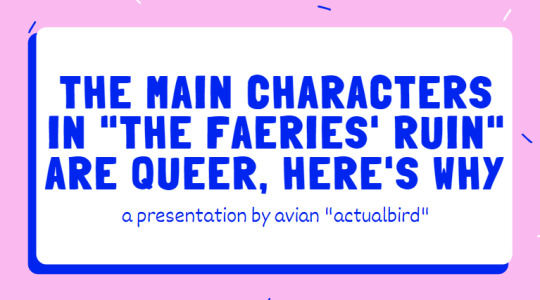
Good evening class.
Last last time I attacked your dashboards with a long post, I discussed Neopets that would benefit from therapy. I’m sticking with my Neopets shtick but in a funkier Pride flavor. In this post, I will be discussing why the three main characters of Neopets’ “The Faeries Ruin” are queer.
So what is “The Faeries Ruin?”
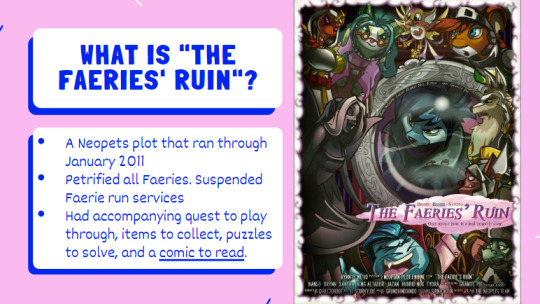
“The Faeries Ruin” was a Neopets plot that ran through January of 2011. Plots can affect the website's appearance, services, and gameplay, and this plot was most notable because it turned all the Faeries of Neopia to stone.
Quick crash course on Neopets lore, for those of you who don’t know anything about it: Neopets are the main population of the planet of Neopia, but they share the world with other creatures as well. One of these creatures are Faeries, magical beings who can be benevolent or malevolent. Majority of them are good, and can be visited to receive gifts, abilities, new appearances, better stats, etc. Faeries are the most powerful creatures on Neopia. With the Faeries of Neopia turned to stone, all Faerie run services, from games to shops, were suspended because. Well. It’s hard to run a business when you’re stone.
“The Faeries Ruin” had an accompanying quest to play through, items to collect, puzzles to solve, and most important to our discussion, is the accompanying comic to read.
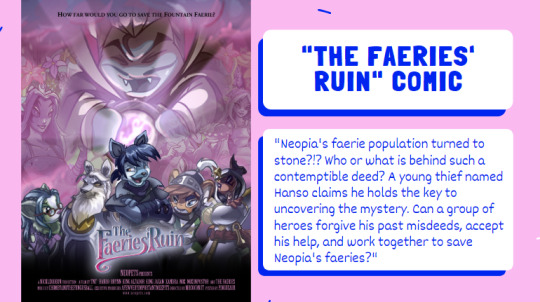
“The Faeries Ruin” comic is 17 chapters plus an epilogue. You can read the synopsis on the slide, and the story follows Hanso, a thief, Brynn, a guard, and Xandra, a scholar, who are all investigating the curse put on the Faeries.
A lot happens in the comic. Really, a LOT, so I don’t have time to summarize it for you. If you’re curious, you can read the plot here, and I’ll explain plot stuff as it becomes relevant to our discussion, but what’s really important are the characters.
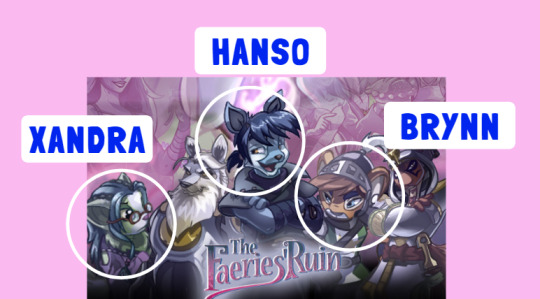
These three in particular, Hanso, Brynn, and Xandra, are who I will be focusing on from the queer perspective.
But because I aim to be inclusive, before we dive into calling Neopets characters queer, we need a quick crash course in ‘queer’ definitions.
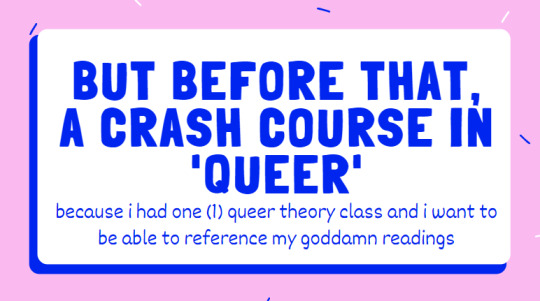
This is just so that we’re all on the same page. (Also so that I can use the readings I got from the queer theory class I was in last semester.)
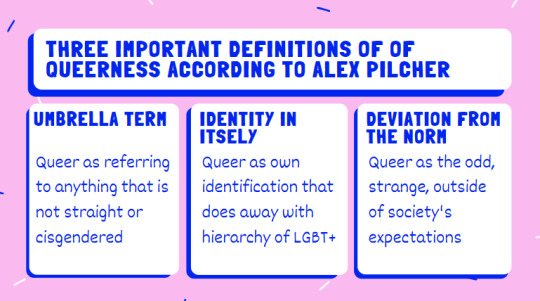
Alex Pilcher in the Introduction of “A Queer Little History of Art” gives the word “queer” three definitions. First is the simplest, the word “queer” can act as an umbrella term for anybody who is not straight or cisgendered. The second definition is “queer” as an identity in itself. Instead or in addition to using sexuality or gender labels, one can opt to identify as queer and that does away with any hierarchies or too small definitions that may bother other people. I, for example, am bisexual, asexual, and nonbinary. However, that’s kind of a mouthful, and sometimes I don’t want to explain every facet of my identity. So sometimes I just tell people I’m queer, and fuck them if that’s confusing, it feels good for me. The third definition of “queer” is what I will be referring to quite a lot of times in this discussion, “queer” as a deviation from the norm. This is a callback to the word’s more archaic use, meaning odd or strange. What is “queer” then is what goes beyond or resists against society’s expectations.
Queer Theory is a huuuuuuuge academic genre, and this is just the tip of the iceberg. But we’re on a schedule here, so let’s queer some goddamn Neopets.
First, we have Hanso.
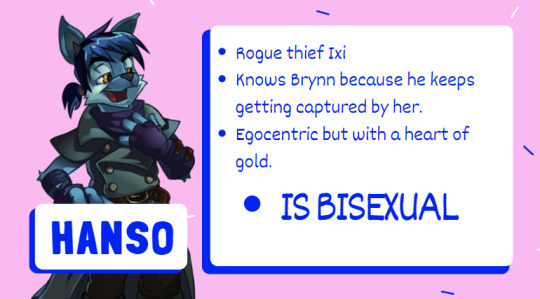
His Neopets species is an Ixi and he is a young rogue/thief. He knows Brynn because he’s a very shitty thief and he constantly gets captured by her. His personality is self centered and egocentric, but deep down, he has a heart of gold, even if his morals are a little skewed.
Also I think he’s bisexual. Why?
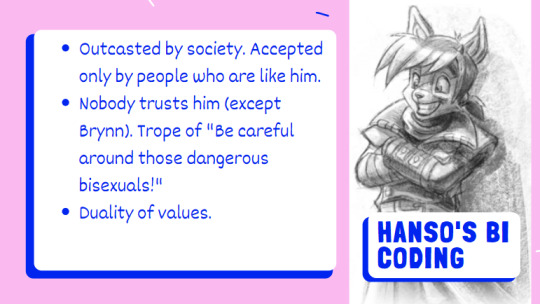
As a rogue/thief, he is outcasted by society, a type of queering from the norm. He is only accepted by those like him, which symbolically is parallel to how queer people often find other queer people to be with. Aside from Brynn, nobody trusts him. They think him to be a liar and a cheat, and this, I think, is parallel to the unsavory trope of the “untrustworthy bisexual.” Much the same way bisexuals are often told to “pick a side”, Hanso has both a desire for good and a desire for mischief, a duality that confuses other Neopets, and makes them wary of him.
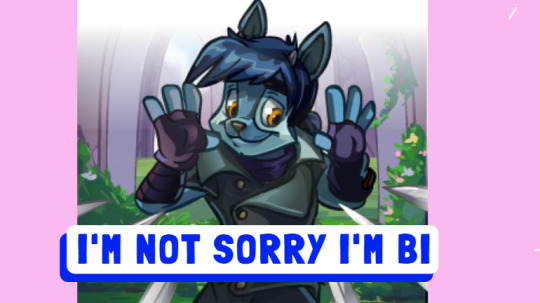
Hanso is bisexual. And he isn’t sorry about it.
Next up we have one of my early childhood crushes. Brynn.
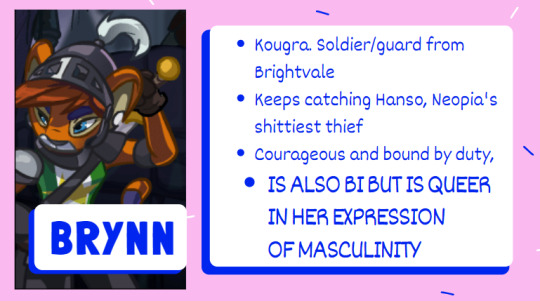
Brynn is a Kougra, a feline like Neopets species. She is a guard/soldier from the land of Brightvale. She knows Hanso because she keeps catching him, he’s a terrible thief. Her personality is one dominated by courage and a duty to Neopia’s safety.
And I think she’s also bisexual, but more interesting to me her queer expression of masculinity.
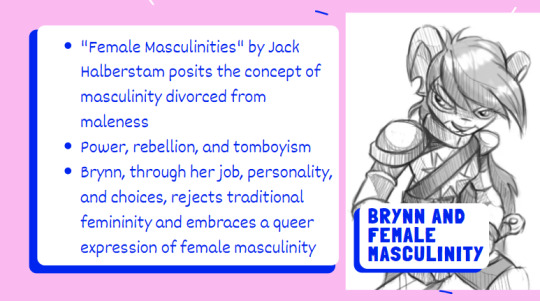
Jack Halberstam, a transgender man, wrote a book called “Female Masculinities” prior to his transition (I mention this because I know a lot of you may be wondering why a man gets any say about women’s issues, but I think this is a special case and that his views are still valid.) Halberstam, in his book, posits the concept of masculinity divorced from maleness. What this means, in simplest terms, is that masculinity is not something inherently male, just predominantly male. A female masculinity is thus outside of the norm, and a unique and queer expression of gender.
Concepts related to masculinity are things like power and rebellion. Strength, force, will, that kind of stuff. When we remove these things from maleness and allow femaleness to have these concepts, one of the results is tomboyism. The phenomenon of tomboyism is when a girl, usually young, exhibits masculine qualities. The thing about tomboyism is that it is reluctantly permitted during childhood but less expected as one grows older, the assumption being that a woman will submit to the societal expectations of what a woman is “supposed to be.”
I cannot find any canon sources to say that sexism is a huge problem in Neopia, but gender roles are still present. While we don’t see Brynn’s childhood in “The Faeries Ruin”, it doesn’t take much to imagine that her peers would be surprised with her choice to join the Brightvale Guard, a traditionally male pursuit. And yet she does it. She works hard and becomes such a good soldier that she aids King Altador himself during the story, that King Altador trusts and respects her opinions. Brynn rebels against society’s standards and asserts her own power.
Her personality exudes masculinity as well. Throughout “The Faeries Ruin” she is often dominant over the course of investigation, taking initiative, sometimes omitting truths for the greater good, and generally holding her judgement in high regard.
Her choices, especially in regards to her relationship with Hanso, is also something of note. Brynn is the one doing the catching and Hanso is the one being caught, an interesting subversion of expected gender roles. I will admit now that I have been withholding some information. Hanso, later in the plot of “The Faeries Ruin”, admits that he wanted to get caught by her as often as possible so that he would have an excuse to see her. Brynn did not know this, but I see it as a Hanso recognizing Brynn’s power and masculinity. I see it as a very romantic submission of Hanso to Brynn.
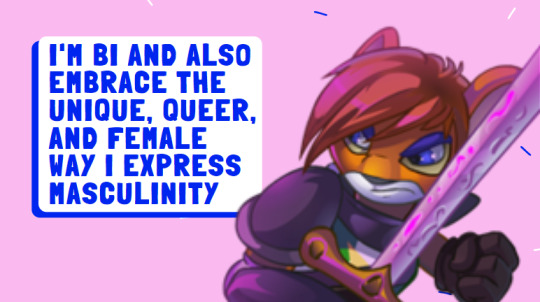
So Brynn is bi, because I say so. And she expresses masculinity in a unique, queer, and female way.
Now, before we move onto the last character, Xandra, I need to talk to you guys about Brynn and Hanso’s relationship. I think it is very good, it was one of my first OTPs, and here’s three reasons why it’s a good ship.
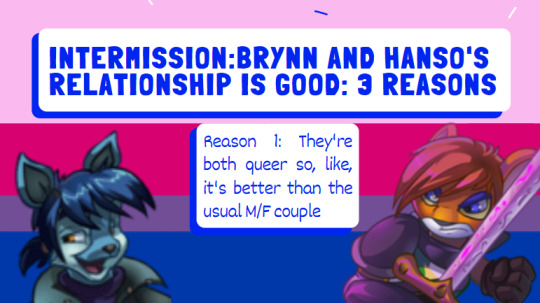
Reason 1: They’re both queer, so like, it’s better than the usual M/F couple. Bi people have more genders they’re attracted to, so the person they do end up choosing had to be better than literally everybody else. We can rest assured both of them are good eggs that are compatible with each other.
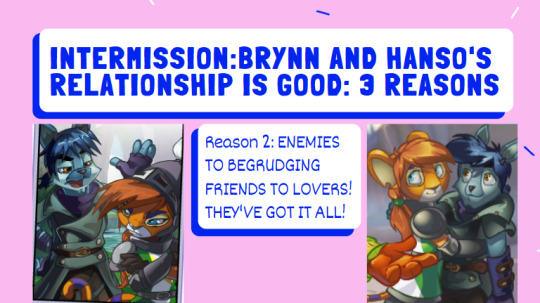
Reason 2: Their relationship over the course of “The Faeries Ruin” is that of the “enemies to friends to lovers” trope. Which, HELLO? GOOD SHIT? SIGN ME THE FUCK UP? THE HOSTILITY SLOWLY GIVING WAY TO RESPECT? THE RESPECT TURNING INTO ADMIRATION? Your honor, it’s delicious.
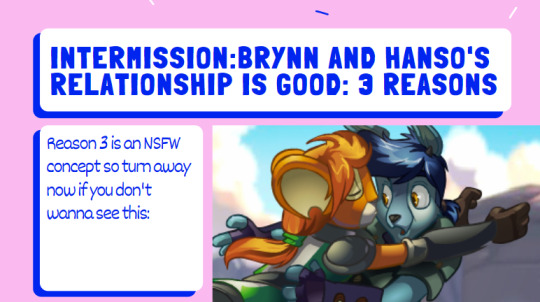
Reason 3: This reason is an NSFW concept, so if you don’t wanna see that, just Ctrl+F to the phrase “This brings us to our last character, Xandra” to skip it. We good? Everybody continuing to read wants to see this? Okay.
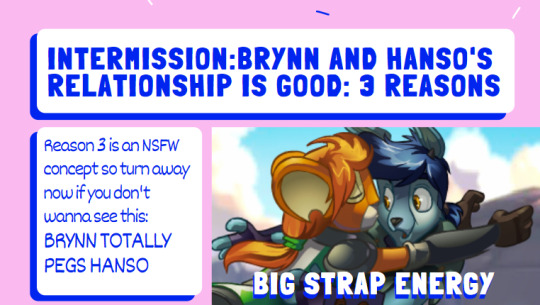
BRYNN TOTALLY PEGS HANSO. Like, I don’t have any sources, but by this point in the presentation, I hope I’ve established myself as an expert authority, and I hope you just believe me. She has the sword, in this relationship. Both literally and metaphorically. She pegs him and her strap is huge.
This brings us to our last character, Xandra.
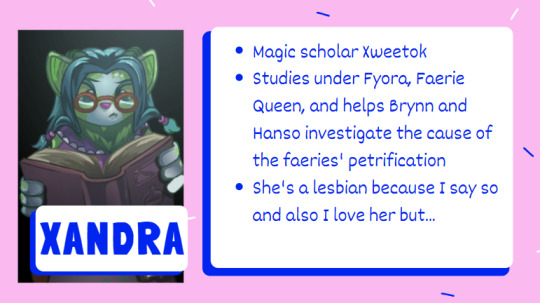
Xandra is a Xweetok and also a magic scholar. She studied under Fyora, the Faerie Queen, and helps Hanso and Brynn with their investigation of the faeries’ petrification. She’s a lesbian because I say so, but uhhhhhh…
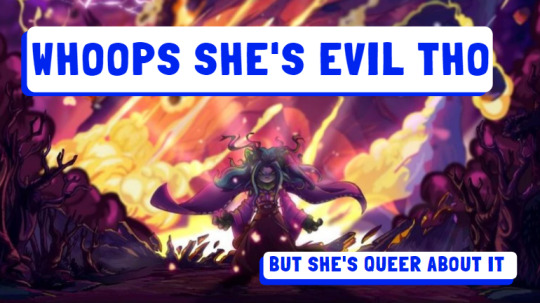
She’s also evil. Towards the end of “The Faeries’ Ruin” it was revealed that Xandra was the one who petrified the faeries all along. So yeah, she’s evil, buuuuuuut she’s super queer about it. How? Well, the answer lies in her motives.
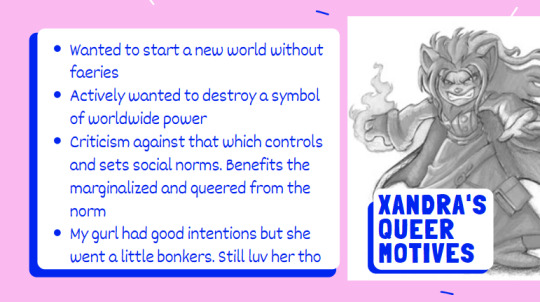
The reason why she petrified the faeries was because she wanted to start a new Neopia without them. She believed that the faeries were hoarding power instead of using it to truly help Neopians. She actively wanted to destroy not just the faeries, but a symbol of power and control that arguably rules the world she lives in. She criticizes against that which controls the social expectations, and this criticism and questioning benefits the marginalized, the queered from the norm. Her intention was to create a kind of utopia free from a governing body that holds all the power. That’s pretty damn queer.
Honestly, I’m a little pissed she was branded as evil for this, but it was revealed that when the faeries were petrified, their good magic was gone and left Neopia vulnerable to evil magic shadows and Xandra didn’t really care. So uh, she had good and radical queer motives, but she went a little bonkers with power. I still love her though.
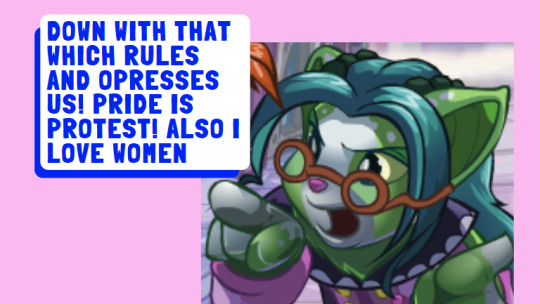
So, Xandra is pretty awesome, I hope she gets therapy then attends a Pride protest. She would totally be there reminding everybody that Pride started with riots. Also she loves women.
Thank you all.
(Read my other off the shits analysis essays at actualbird.tumblr.com/tagged/nobody-asked-but! If you have a request or suggestion for an off the shits analysis essay I can write, send me an ask!)
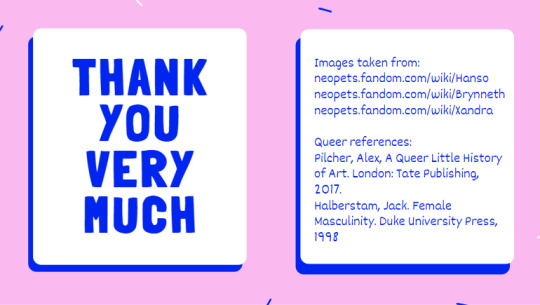
30 notes
·
View notes
Note
How is fandom any different from any other hobby? If you go to a knitting club that's the thing that ties you together initially, your enjoyment of knitting and THEN you get to talk to people about other things that you might have in common.
Because if you have a knitting club it meets once or twice monthly. You come together to talk about knitting and to knit mainly, and were it not for knitting you would not be socializing with those people. Then you all disperse and go about your regular lives, having interactions w other people without being about knitting, and knitting without making it a central deal. You can meet some people through a knitting club that you may get along with outside of knitting, but if you go to a knitting club (or a book club or a baking club etc) expecting that everyone you interact with there is going to be your friend rather than a friendly acquaintance just bc you share a hobby, that would be an immature and mistaken idea.
A knitting club takes place somewhere, it starts and it ends.
However, fandoms are a largely online phenomenon these days, and the issue with the internet as it functions these days is that people are ‘always on’. You find a new thing? Oh that means you have to follow blogs/twitters etc allll about it so that you have a constant stream of it in your awareness at all times. You watch/play/read the thing in your personal life, but you also stay talking about it/consuming it whenever you are online which is statistically several hours of the day. Meanwhile fandom is touted as a familial community where people seek to find meaningfu belonging and friendship, which is why so many people in fandom become hyperattached and extremely defensive of their favorite media no matter how problematic it may be or no matter the fact that it is normal that many people may have criticisms of it; ppl get like this because unlike with the stereotypical concept of a knitting club, online ever-present fandom again becomes so much of a person’s life that they start to identify with it, and thus any attack on its central media is an attack on them.
Beyond that it’s just not healthy for the main thing you interact with and through mentally to be some consumptive media. It can be a hobby if yu’re a creative in the fandom (though even that can have its downsides) but for the most part ‘fandom’ is not in and of itself the same thing as hobby so don’t compare them this way.
Brainrot is real, I swear to you and it’s not particularly healthy (though of course sometimes ppl are coping and while that’s not a great long term thing I’m not moralizing whether this is good or bad) to be so fixated on some show or game or whatever; especially when it gets to the point that people become averse to interacting with people outside of the fandom, or struggle to do so without some media as a go-between.
Insular communities are not your friends, and there’s a certain distance one should keep- in a sense you need to have a center, know where it is and be able to stay connected with it instead of dumping a huge amount of your attention into what is actually a fleeting source of interest and sometimes, sadly, and addictive replaacement for interaction that begins to make people more and more reliant on the spaces it creates in order for them to relate.
The key point here is that passively consuming and obsessing over media isn’t a hobby like knitting is (art creation can be of course! But that would be having a hobby within a fandom- being a fan isn’t a hobby and it’s not an identity though many people sadly treat it like it is) and our ‘always online’ culture makes it very difficult for people to maintain healthy boundaries, limits and perspectives on just how much they are letting something consume them as they consume this.
This can apply to anything really, from book series’, shows, social justice communities, lifestyles etc. ‘Online communities’ have very nebulous boundaries (or lack thereof, again, bc one tends to just consume and exist in a never-ending data stream of their chosen content) and don’t actually fulfill many of the things RL community can and that really should be kept in mind. Not to mention the effects of insularity (aka brainrot).
Beyond this, even the idea of ‘fandom’ as an actual thing is false. It’s a kind of false solidarity. One says “Oh I;m in the x fandom” but that isn’t actually a real community. There are just a bunch of people who like a thing and think that unites them but the reality is all fandoms are full of infighting and drama and that happens BECAUSE people are acting like they are supposed to have solidarity. They identify with their favorite show and think it has x,yz, meanings and when other people don’t feel the same, because actually everyone likes things for different reasons, they flip shit because they feel betrayed- again because of the notion that a fandom is an actual community of likeminded people.
it’s not.
15 notes
·
View notes
Text
12 DAYS OF STAR WARS: AN ORIGINAL FANBOY-DRIVEN BLOG SERIES “EPISODE 7: SOME OF MY FAVORITE STAR WARS EU CHARACTERS”

Here is a list not ranked of some of my favorite characters in the Star Wars Expanded Universe. Both canon and non-canon. *Specifically not gigantically main characters in the mainline saga films and ones who often have extensive material in tie-in media.*
GRAND ADMIRAL THRAWN
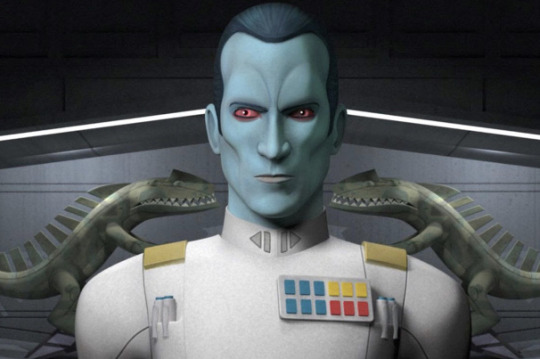
In terms of comparing Star Wars characters to archetypes, Grand Admiral Thrawn is the evil Sherlock Holmes of the Star Wars galaxy. The smartest, most tactical, perhaps the most shocking Star Wars villain is Grand Admiral Thrawn. A character with a unique philosophy and battle strategy. He looks at the art of a civilization or planet in the beginning of Heir To The Empire where he can tell/figure out something about that civilization/species through their art which is fascinating. He is a unique, evenly tempered character and listens to what people have to say if they have good ideas. Thrawn is a character who is evil who also has control of his emotions. He isn’t like Kylo Ren who flips out on his macbook pro or is like “Fire Everything!” Thrawn is ultimately the antithesis of that. He is the antithesis to Darth Vader and The Emperor in terms of their philosophy which is perhaps scarier and his philosophy is ‘don’t let your emotions consume you’ and is as level-headed as Darth Vader and is very much all about power. He is an incredibly unique character and villain unlike any other in Star Wars lore. There is so much rich Thrawn material out there, from the various novels by Timothy Zahn such as the original Thrawn Trilogy: Heir To The Empire, Dark Force Rising & The Last Command. As well as the Modern Thrawn Trilogy (set before the events of his appearance in Star Wars Rebels) Thrawn, Alliances and Treason. As well as many, many others I have not mentioned.
MARA JADE
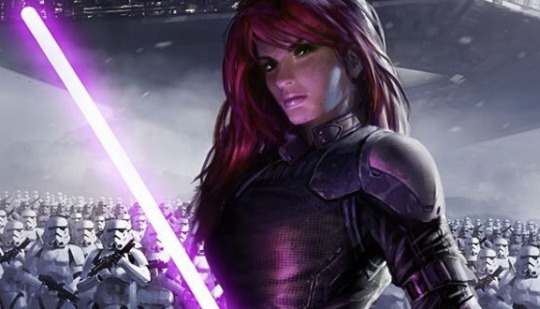
She is a great character who starts from a very interesting place in Heir To The Empire who started out as a Force-sensitive Imperial assassin who is easily next to Thrawn, both are the best characters Timothy Zahn created in the Star Wars EU lore. She much like a lot of characters I will be talking about, are all truly authentic Star Wars characters. They all have the makings of a great iconic Star Wars character who went on an exciting redemptive journey across the EU from being an Imperial assassin who Palpatine wanted to kill Luke Skywalker to eventually become the wife of Luke Skywalker and mother of Ben Skywalker as a Jedi master. There was a lot that happened to her with the Yuuzhan Vong but everything about that outside of Mara Jade gives me a gigantic headache. Anyway she is a great character who should be integrated into the new canon and should be established to have been married to Luke. (In my personal headcanon Luke was married to Mara Jade in the gap between ROTJ and TFA) She just has one of the best character arcs in all of Star Wars and is a phenomenal character.
QUINLAN VOS
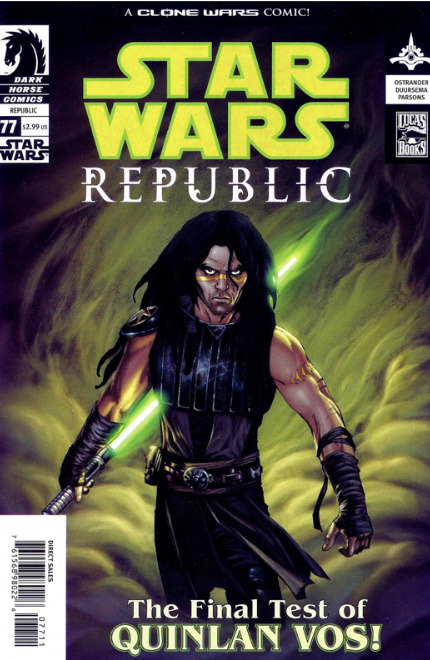
One of my favorite characters in the Expanded Universe is Quinlan Vos who has stories in the comics that came out during the time of The Clone Wars comics of the early aughts written by John Ostrander. The story of him really goes across The Clone Wars. He is an incredible character who is ultimately an exploration of the ideas of the Dark Side and the Light Side and the temptation of the Dark Side and he kind of rides that line between the two. He is very much a rogue Jedi and kind of goes with the dark and dabbles towards it but ultimately is a good guy. His story in the Clone Wars from Ostrander is very pivotal to his character. Also Dark Disciple is another Quinlan Vos story that is in canon that is based on unused scripts of the modern Clone Wars episodes and that is as well a good Quinlan Vos story with his unique relationship with Asajj Ventress.
CADE SKYWALKER
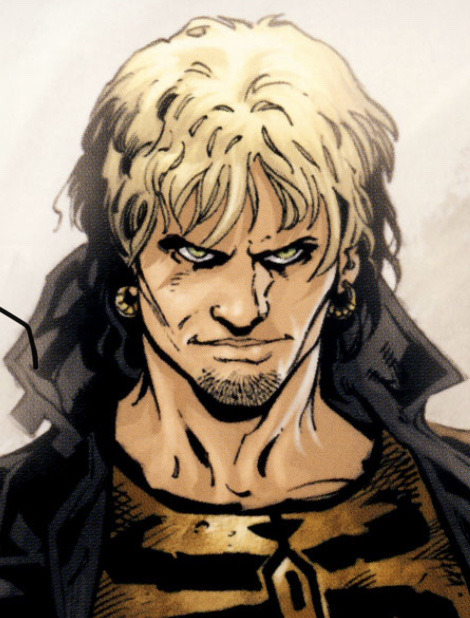
The main character of perhaps the best Star Wars things next to The Original Trilogy which is John Ostrander and Jaan Dursuma’s Legacy. He ultimately much like Quinlan Vos is an extremely fascinating character. He is a bounty hunter who has all but rejected his Jedi teachings and he does Death Sticks. He really dances on the line between Dark Side and Light Side in such an interesting way where there are things he does for good but he’s using Dark Side powers and bringing people back from the dead which is quote Palpatine in Revenge of The Sith “Unnatural…” He is a unique conflicted character and he is very much one of my favorite characters in Star Wars lore. He is very much like Quinlan Vos the archetypal John Ostrander dark Jedi character in a good way.
BOBA FETT

I love Boba Fett. He’s got a bad reputation now especially with a show about a super competent Mandalorian who is ‘The Mandalorian’ who is clearly not Boba Fett because of a thing that he does at the end of the pilot episode that Boba Fett would never do. Boba Fett ultimately unknown to the general mainstream public truly is not just a bum/incompetant clone/bounty hunter that ended up in Sarlacc Pit. He was once a and almost had a solo-novel written by Karen Traviss (A great Star Wars writer who wrote many great books such as The Republic Commando series, also has an obsession with Mandalorians) However in-canon as of now, Boba Fett died in Sarlacc Pit and ultimately the badass Boba Fett pre-1999 EU is now alive and well in The Mandalorian.
DARTH MAUL
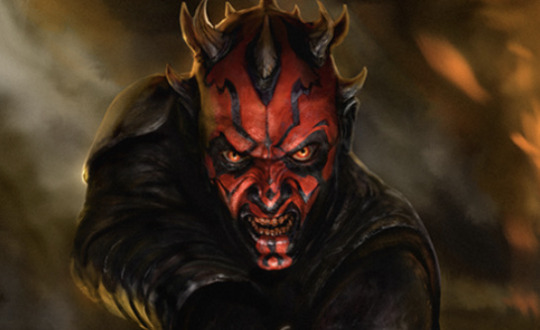
One of the boldest creative decisions in all of Star Wars was in the fourth season of the modern Clone Wars TV Show which was a moment I remember seeing on television for the first time which is… The Return of Darth Maul. This led to what I call the “Maul Resurgence” where after I watched that story arc in television I was obsessed with Maul and had a connection to Maul outside of the double-bladed lightsaber and the spiky horns I was fascinated by his rivalry, connection and hatred of Obi-Wan Kenobi. I read the novel by Michael Reaves that was a prequel to Phantom Menace which was Shadow Hunter. Which established his backstory as being raised by Palpatine and was inflicted with Sith tattoos and was originally a Zabrak (which changed due to The Clone Wars he is now a…Dathomir. He is ultimately an assassin told he’s a Sith, not really a proper Dark Force user, he was a mad dog on Palpatine’s leash that became used everywhere. He is very much the prequel’s Boba Fett where he looks super cool and most of the public doesn't know he survived after his initial cheap death where they got a comeback and more development. In The Clone Wars He spent years in shame and squalor and when he gets power back and gains composure you see he learned the lessons Sidious/Palpatine taught him and that’s what makes his duel with him, Oppress and Sidious/Palpatine so impressive is that you can make the argument that Maul was legitimately a threat to Sidious. He is capable of being a thrilling and terrifying threat. As a Maul fan My favorite scene in Solo: A Star Wars Story is when you learn he is the head of the criminal organization of Crimson Dawn and the idea of him being a crime lord is genius. His story is ultimately perfectly wrapped up in Rebels in perhaps my favorite and in my opinion the most epic lightsaber fight in all of Star Wars which is his last battle with Kenobi. It’s an old-school epic samurai fight with such ambience and power and perfectly ends Maul story and captures the evolution of Obi-Wan and Maul’s relationship.
THE CHILD
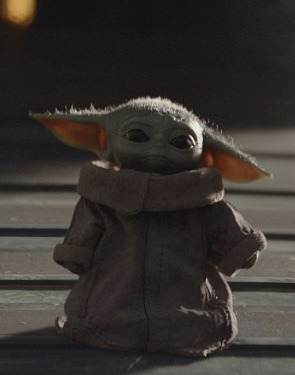
The social media phenomenon himself gets what he / she deserves and is perhaps my favorite youngling in Star Wars lore (sorry, no disrespect to characters like Ashoka). It may seem like I’m hopping on the bandwagon but I really am not, outside of Yoda and Yaddle I believe, there is one other character who is of the same species who fans often mention and even casual or non fans mention a lot who is The Child. There is ultimately I think going to be a solid reason as to why he is such a phenomenon. Much like these other characters this is something about The Child that is distinctive and unique in that all of these characters are wholly their own and go on their own journeys and I’m sure The Child will be one of them. He is young for his species only fifty years old and has a long, long life ahead of him in a galaxy far, far away…
-LilBitWriter (12/19/19)
7 notes
·
View notes
Text
Overall thoughts on Les Mis BBC
I decided, after all those summaries I made, to write what I hope can be a more coherent opinion on what I thought of the adaptation as a whole. I wanted to make sure to state that my critical reactions weren’t for entertainment purposes only or exaggerated for the fun of it but based on real concerns I’ll expand in this post. This is like the “serious companion”, if you will.
I don’t know if anyone cares about it at this point, but I feel that even though my summaries helped me go through the immediate frustrations in a (mostly) lighthearted way, it’s the distance from having watched it all what gave me a little bit more clarity to order my thoughts.
I’ve established my opinion isn’t worth a damn, I’m not smart or knowledgeable enough for this fandom and, needless to say, these are all my personal opinions, take them with a grain of salt or a bathtub of it. I’m a worthless nobody and my words have no value, but the internet is still (sort of) free, so here I go.
Introduction: the initial news, Andrew Davies & the PR mess
BBC announced the adaptations of 2 media phenomenons which started as books that I love so much I’m considering tattoos of both. And, for both of them, my main concerns were on the person adapting the script.
On the one hand, there’s His Dark Materials, a book series that made me the person I am today, pretty much. One of the directors is none other than Tom Hooper (what are the odds) and the script adaptation was in the hands of Jack Thorne. Cursed Child Jack Thorne. Yeah, not thrilled about that.
Surprisingly enough, His Dark Materials was given a projection of 3 possible seasons, rather than just one, the 3rd hasn’t been yet confirmed but the fact that the script was made thinking on one season per major book on the series, and that each season has 8 episodes planned, at least gives me a bit of hope, even if the person adapting it isn’t in my favorites list.
Les Mis, on the other hand, went to the hands of Andrew Davies, another person I don’t trust.
I’m one of those folk who was never too fond of the ‘95 version of Pride and Prejudice, mainly because of how Darcy was made into a sort of sex symbol, where his flaws were seen as “attractive marks of broody character” rather than vulnerability and with gratuitous sexualizing fanservice. I know a lot of people love it for that and that’s cool, you do you, but it’s not for me.
Then, when he adapted War and Peace, he talked about adding more sex to it and had the Kuragin siblings shown explicitly sleeping together from the get-go in episode 1 and that’s when I stopped watching (there were other things I didn’t like but that one was my limit).
To make matters worse, it made me weary that Les Mis was getting an overall amount of only 6 episodes whereas HDM was getting a potential 24-ish. That was an odd choice.
So, as you can guess, I knew coming in that Davies writing the script, a script with a limited time-frame for the story, was a huge risk.
But, on the other hand, as the cast was announced, I got excited. Especially for people like Archie Madekwe, Turlough Convery, Erin Kellyman and some famous actors like David Oyelowo. Their filming logs on social media, how nice they all were and how much fun they had filming made me happy. I felt that maybe these great folks could turn around whatever the scrip had to disappoint me.
But then came all the PR stuff.
The more I read Davies & co. talking about the show, the less hope I had for it. Talking very badly about the musical and the 2012 movie, calling female characters “not complicated”, insulting Cosette, saying that Javert’s lack of explicit heterosexual sex in the brick was reason enough to push a homosexual narrative centered on an unhealthy behavior, patting themselves on the back for having a diverse cast as if no other adaptation of Les Mis had ever done it before...even their talks about Fantine’s make up made me weary. And, let’s not forget their ridiculous insistence on not having songs.
By the time the show premiered, my hopes had dwindled. The excitement I had upon knowing there would be another Les Mis adaptation so soon, a BBC one at that, and with a cast I had hopes for, was blurred by all the nonsense of PR and I was more afraid than hopeful.
In the end, after having watched it completely, and as you can see for my summaries, I was heavily disappointed. I’ll try to list some of my biggest concerns, in no particular order.
I can’t be super extensive about it, because there are a lot of points to go over, but there are a lot of amazing opinion pieces out there about specific issues, so you don’t need me for that.
Anyway, let’s delve into some of my biggest problems with BBC Les Mis.
Problem #1: The portrayal of femininity
Solely by the fact that Davies stated that women on Les Mis “are not terribly complicated” you know that things are not going to go all too well on that front.
I’m going to pick 3 characters to showcase how badly women were portrayed in this: Fantine, Cosette and Éponine. I’ll leave other characters for another section.
1. Fantine
I’ve talked about Fantine before, upon receiving some questions on my summaries, but I’ll try to explain it all in a more understandable way.
The lens in which Fantine was seen was sexist from the get-go. The way in which the story was framed made the audience complicit in the choices she was making, choices that were negatively regarded by the narrative perspective alone. Her “fall to disgrace” was framed as her own decisions being incorrect, silly mistakes that were easily avoidable, and never regarded as the result of living in a society that was unable to contain her and see her as a valid human being. But we’ll get to that when we talk about the politics (or lack thereof) on this show.
Like I said in my response before, the way in which Fantine is portrayed, even in the musical itself, varies greatly performance to performance. Patti LuPone performing I Dreamed a Dream after Fantine gets dismissed isn’t like Anne Hathaway performing it after she has become a prostitute and neither carry the same implications as Allison Blackwell in the Liesl Tommy’s Dallas modern production, influenced by her experience in apartheid South Africa.
Still, the key element to developing Fantine’s portrayal, when it comes to sexism and the showcasing of her environment, has two layers: the actual oppression showcased in the source material and the contemporary interpretation or lens in which an adaptation will view it.
In this version, Fantine’s character was toned down in her attitude. She was less reactive than in the brick, a lot more passive, a lot more of a tragic figure, which paired up with the fact that this adaptation covered her entire “fall to ruin”, from meeting Tholomyès onward, made her a victim of everything that happened to her.
A victim of her own bad decisions, though, not of a social context that was failing her.
But the worst part is in how the focus of the show is placed. You can have Fantine being a summarized version of herself, with less spunk, and still showcase through her that the circumstances she was in were permeated by an escalating force of social disadvantage and oppression.
This adaptation made, like I said, the audience complicit in Fantine’s decisions as if she was a princess in a movie, unaware of the threats she was getting herself into by her own naive foolishness.
Tholomyès is blatantly shady, clearly dishonest, not at all charming or in any way trustworthy and Fantine gets a “voice of reason” on a friend who tells her various times that he will eventually leave. There are a lot of red flags, blatant for the audience, that Fantine chooses to dismiss. The show focuses less on why Fantine trusted Tholomyès and more on her making a clear bad choice we all knew was doomed from the start.

This becomes a problem once again when she chooses to leave Cosette with the Thénardiers. They are very clearly shady, very blatantly aggressive and ready to take advantage of her, visibly manhandling Cosette in front of her and asking for more money on the spot, and Fantine again naively ignores all of this.
They do it again when she enters employment in Montreuil. She talks to Valjean himself in this version, and is asked repeatedly and with kindness if she has a family. The scene makes it seem as if she could have easily told the truth, especially because we were previously given a scene in which Fantine hears a speech talking about how Valjean is the Best Person Ever and could potentially help her. Still, she chooses to repeatedly lie and the show makes it seem less for necessity and more for a sense of pride of some sort.
(Also, as a foreshadowing of creepy Valjean to come, there are some insinuations from her co-workers that she could seduce Valjean, which is confusingly placed and awkwardly added where it is.)
Then, after she’s dismissed, there’s a man in a post office who asks her, after receiving letters from the Thénardiers (to which she reacts a lot more passively than in the brick), why she doesn’t bring Cosette to live with her, in a condescending tone, as if he was stating the obvious. Fantine responds again as if she was doing it out of pride. The same man is the one to suggest her to start selling her body and then tell her she should have done it before selling her hair and teeth because “nobody would pay for her after that”.
Every turn we’re met with ways in which Fantine’s decisions are seen as foolish in the eyes of the viewer. It’s like Blue’s Clues or Dora the Explorer when they ask stuff to the audience for the kids to say they shouldn’t do something. It’s patronizing as fuck, is what it is. And, yes, sexist.
These narrative choices are sexist because they erase most of the social and political situation which made Fantine vulnerable in the first place, to push the tragic drama as if she was a victim of being “too naive”. It’s sexist because it makes the audience know from the get go that what Fantine is doing is a “bad choice”, easily avoidable mistakes that whoever writes is smart enough to sense are bad but poor naive Fantine can’t understand.
It isn’t just that she’s called a whore a lot of times, that she’s smashed against walls and the ground hard enough that Lily Collins was actually hurt, that she’s shown explicitly being used by a patron on the street. It’s that all of it is done with the added layer of her having “chosen wrong”. That everything is framed as the consequences of actions that the narrative voice, as well as the audience, are smart enough to know are wrong, but poor little Fantine can’t handle.
Like many things in this adaptation we’ll see later, Fantine’s journey is framed more like the tragic end of a woman who didn’t know how to choose right and was punished for said choices rather than the result of an unfair society which didn’t allow women any freedom to choose and didn’t see them as worthy human beings.
2. Cosette
When Andrew Davies called Cosette a “pretty nauseating character” in need of change, I knew I was up against one of those people.
Cosette is probably one of the most underestimated female characters in literature, and adaptations tend to do her dirty very often. I’m not even fond of her interpretation in the musical all that much, which goes in tow with the interpretation of Éponine. I’ve seen my fair share of men on youtube claiming Gavroche should be the face of Les Mis rather than Cosette, I’ve received my fair amount of messages claiming she’s The Worst, I’ve seen it all.
This adaptation does with Cosette something that, out of context, I would have thought impossible. They manage to somehow attempt to make her more “active” (they would call it “strong” but I have problems with that denomination) while making her even more of a helpless victim. It’s a pretty impressive oxymoron.
Let’s begin with little Cosette.
This adaptation does something very weird in that it only showcases Cosette’s storyline as a child when it serves other characters, but then intends to build upon the abuse by mentioning it or making it clear that adult Cosette remembers it well.
So we see Cosette when she’s important to Fantine’s storyline, the Thénardiers’s storyline or Valjean’s storyline, but not much about her on her own, aside from one time she’s looking at dolls and another time when she’s being beaten up by Madame Thénardier, which could be also a moment for the Thénardiers and not solely for Cosette’s narrative.
What I mean with this is that the view on her is reduced to a side character rather than a main one and, with that, her perspective on her own abuse isn’t taken into account. You don’t know how Cosette feels about things, you don’t see her perspective on it, you only see what others do to her but never get to see her side of it. For all the musical erases of her narrative, at least they give her Castle on a Cloud.
It’s with little Cosette where we start to see this weird sense of sexually charged perception towards her relationship with Valjean.
For some inexplicable and highly alarming reason, it’s implied by various witnesses in different occasions that Valjean’s intentions with Cosette may be inappropriate, and I would have let it slide as just people thinking The Worst out of living in a social context in which The Worst is most often the truth, hadn’t that perception carried throughout the series and mixed with Valjean’s erratic and possessive characterization.
When Cosette grows up, she gains a bit more focus, but she also starts to be charged a lot more sexually.
Both Cosette and Éponine are sexualized and objectivized in this adaptation. This will be addressed later, but most often than not this sexualization acts as an accessory to a narrative about masculinity.
Cosette’s virtue, beauty and body are talked about and even exposed in various moments. They tell her she can’t be a nun because that would be “a waste of her beauty”. In that dreadful scene in the dress shop I talked about in summary 4, the shop assistant again implies that Cosette is Valjean’s lover and lets him see her in undergarments through the curtain, with clear intentions. Valjean’s erratic persona is intent on separating her from Marius, explicitly telling her he’s worried that she will be taken advantage of by men, bringing up Fantine’s history to her with that in mind, while putting her in danger and in the company of the Thénardiers again, in more than one occasion.
Adult Cosette has visible signs of the trauma she suffered, which is an interesting direction to go. I haven’t seen an adaptation taking such a big route on her remembering her past abuse, and is a change that worked in performance, Ellie did some great visible responses like covering herself when Valjean wakes her up or going fight or flight every time she sees Thénardier. She is visibly upset when Marius gives him money and looks both angry yet still hesitant when she sees the man for the last time.
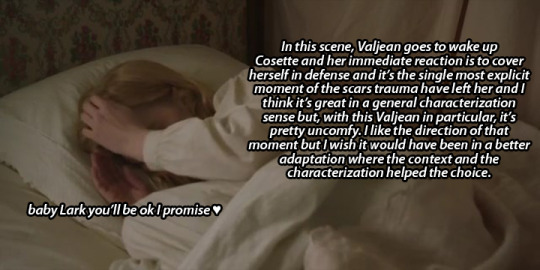
But all that kind of loses its importance when the men around her not only don’t give a shit but also do their worst.
Valjean manhandles her, harms her even, pushes her to the limits of her emotional state by taking her to see the prisoners intentionally after she mentioned prison, acting more possessive than caring and more erratically violent than conflicted and concerned.
Marius has a somewhat wet dream about her and then again dreams with her in confusing ways when he’s out of the barricade, with his grandfather talking about her as if she’s a piece of meat even after he meets her and she’s right in front of him.
They tried to make Cosette more aggressive, I think, more reactive, which in some moments worked. But when the lens in which she’s viewed is objectivizing, when she’s being commented on, offered and treated as an object, then it isn’t enough. It makes it worse, actually.
I’m sorry for Ellie, though, she did good.
3. Éponine
Much like Cosette, Éponine’s childhood was all but a few cameos. It’s very often that adaptations try to “tone down” Éponine in order to pull a narrative of her as an underdog in a love triangle, the “friendzoned” girl who tragically dies. The musical does that, for example.
Some of Éponine’s most controversial actions in the brick tend to be most often deleted or changed, except for adaptations in which she’s an “enemy” to Cosette’s narrative of a classic heroine.
It isn’t easy to find adaptations that are able to make Éponine showcase the complexity of her canon character not as a problem but as what makes her character so good and important in the overall story. Hey, even fandom sometimes tends to romanticize Éponine as if she had to be “redeemed” in order to be seen as a worthy character (but that happens a lot with female characters in general).
Éponine doesn’t exist for Marius’s narrative, as the other girl in a love triangle, or for Cosette’s narrative, as an enemy, she’s her own character with her own reason for existing and complex human dynamics that are extremely permeated by the social circumstances she’s immersed in and represents.
I’d say this adaptation is on the group that uses her for Marius’s storyline.
Added to that, it’s one of the worst I’ve seen on that case, because in this one, Marius is complicit of Éponine’s intentions, which are sexualized to a degree I don’t feel comfortable with.
We’ll talk a bit more about the Marius side of things later, but for Éponine, it meant she was reduced to a character that exists to sexually awaken Marius rather than a tragic figure on her own or even a piece of a love triangle. So, basically, this is the worst I’ve seen in a while.
This is clearly seen in that interview when Davies explained why he added that “wet dream” scene, saying:
“One of the best things Hugo does is to have Eponine tease Marius with her sexiness because he is a bit of a prig. So I have introduced a scene where Marius, even though he is in love with Cosette, has a wet dream about Eponine and feels rather guilty about it. I think it fits into the psychology of the book.” Source
Let’s leave out the part where he considers that to be “one of the best things Hugo does” because I cannot deal with that right now. Let’s focus on the other bit.
Like this quote suggests and I said before, Éponine was rather reduced to a tool for Marius’s sexual awakening. In this version, it isn’t only the “wet dream” which precedes more crucial interactions between Marius and Éponine, there’s also a scene where she strips for him through the hole in the wall and another where Courfeyrac is commenting on her and Azelma as Marius moves into the building for the first time.
By the time Marius gives her his money and any sort of bond can occur, it’s evidently clear in this version that Éponine has been teasing Marius and he is fully aware of it. He looks at her through the peep hole licking his lips and then has that disturbing dream where she’s kind of forcing him onto her in a very questionable way.
So, this Marius is by no means unaware of the fact that Éponine was attracted to him in some capacity and has played along her seduction, which makes his dismissal of her and his request for her to find Cosette a lot like he is using her for his own gain and replacing her for another girl.

Éponine’s attitude, much like Cosette’s, tries to be more active at times. She’s confrontational to her parents, seems protective of Azelma and is pleased to see her mother stuck in jail.
However, much like with Cosette, any kind of agency is compromised for having her narrative be serving a male character’s development rather than her own. Her involvement in the barricade is also somewhat modified but, by that time, her journey has already been substantially affected.
Much like Ellie, Erin was a very good Éponine when she was allowed to perform at her best and I wish she had been involved in an adaptation that was able to portray Éponine with more justice.
I’ll talk a bit more about women on the show in general in problem #3 but, for now, let’s move on.
Problem #2: The portrayal of masculinity
1. Javert
I am not the best person to write an essay on Javert, there are a lot of people more capable than me for that, and I may be called out for this and mess everything up, but I can’t write overall opinions without mentioning my issues with his characterization, at least summarized.
Javert is a complicated character. He is, as much as everyone else, affected by the circumstances and a man who goes through a huge emotional impact and sees his values questioned and compromised. His and Valjean’s journeys have a lot in common, in different ways and with different outcomes.
Sadly, Javert tends to be seen as a villain in a lot of adaptations. It’s a way to simplify the plot in the way movies tend to do: something is defined by what the other isn’t, if Valjean is the protagonist, then Javert must be his antagonist. I was worried that this version was going to fall into that trap, because of time restraint and Davies’s tendencies of simplifying complex characters.
Javert’s characterization was erratic, much like Valjean’s. His attitude was blurred by fits of rage and moments of confusing violence, followed by charged pauses in strange cadences which tended to fluctuate. I don’t think his attitude was as all-over-the-place as Valjean’s, but it was certainly not as well defined as other Javerts I’ve seen through the years.
This Javert, however, had a choice made for him that separates him from other versions:
Over tea in central London, Davies tells me that he was surprised to discover that, in Hugo’s 1862 novel, neither character [Javert or Valjean] mentions any sort of sexual experience, leaving the 82-year-old screenwriter wondering, at least in the case of Javert, whether it was indicative of a latent homosexuality. Source
There is a lot to unpack there.
First, there’s this idea of masculinity in which the lack of explicit heterosexual intercourse in canon is directly representative of homosexuality. I’m not gonna delve a lot in the brick but there are a good bunch of characters you can easily read as gay. Hell, there’s that whole thing going on with comparing Enjolras and Grantaire to greek couples. And if you want to write Javert as gay, go ahead, there’s a lot of fanfiction out there who is with you on that and I’m here for all interpretations, no problem at all.
But if you’re going to take that route, you need to be careful with your optics.
This Javert is, at the end of the day, in this adaptation, a gay man of color. He is also explicitly obsessed with Valjean in a way that exceeds his sense of justice. He looks at him undress in prison, is all over his personal space while he’s in chains and later interrogates him believing Marius is his lover, clearly attempting Valjean to confess to him if he was. He receives a lot of comments from an officer who touches him and looks at him strangely in the last episode, prompting an immediate rejection from him.
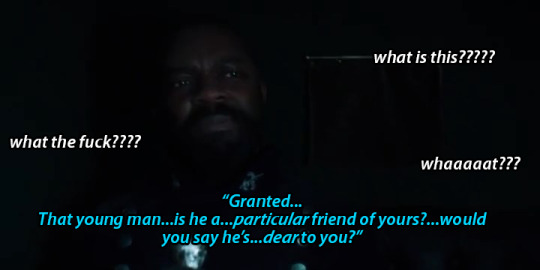
Everything points to Javert’s homosexuality being in the plot only as a further motivator for his need to capture Valjean, which makes for both a problematic portrayal of predatory homosexuality and a subsequent narrative of police abuse, both very problematic aspects to portray through a gay man of color. The way he acts and the way in which people act around him make it seem like his obsession with capturing him is fueled by the fact that Valjean represents his closeted feelings and that is all kinds of messed up.
He is also clearly not as involved in other aspects of the law as he is in capturing Valjean, since Thénardier ends up being a secondary worry to him, even explicitly knowing he has been mistreating and abusing a child, and he also explicitly doesn’t care about his achievements or the ones of his other officers as long as Valjean is on the loose. He lets Thénardier escape prison on his watch and doesn’t take care of it himself, prioritizing Valjean.
It isn’t about what happens in canon or not but in how all of this, in this version, is framed under this idea that Javert is also gay and has an obsession with Valjean that seems predatory in part, rather than fueled by his beliefs. And that is a dangerous optic to write a gay character under. Especially a police officer who is also a man of color.
I’m not the one to talk about that, it’s not my experience to tell and I’m not going to speak over those whose experience this is, but as a content creator, I’d question if my need to diversify is stepping over the lines of problematic aspects that may ill represent the identities I’m trying to integrate. Just saying.
David’s performance hits some very good moments, especially when Javert starts contemplating suicide. That is a very important scene in every adaptation and a very amazing chapter in canon and David does well in performing the turmoil in Javert’s decision. They also add, as a voice in off, the notes he left to improve the service, which is a great touch.
But, much like the other characters I mentioned, his performance is blurred by these writing choices in which Javert has been added this sort of predatory sense in which Valjean in jail symbolizes also keeping his identity hidden away. Davies would probably say his “desires” because that’s the kind of guy he is.
I hope my opinion isn’t overstepping anyone’s voice and I’ll leave the further of this discussion to someone more appropriate, but I felt it was an important matter to include and something we all, as media consumers, must pay attention to.
2. Marius
I had higher hopes for this boy, I really did.
The good thing this adaptation does for Marius is give him a bit more room than others do. They touch more on his relationship with his father and his grandfather, they bring up the Thénardier connection to his dad, they introduce Mabeuf, and they bring him on as a kid in the beginning, which even though questionable in comparison to him having more development as a child than Cosette and Éponine, at least helped to introduce him as another key character of the whole story.
I had hopes that this earlier introduction, albeit unfairly unbalanced with Cosette’s and Éponine’s, would allow for his character to develop more strongly, especially since politics were very present in his conversations with his grandfather and the ideals of his dad. I thought that by introducing politics through Marius that would allow his connection to Les Amis de l’ABC be more profound when the moment for revolution came.
Yeah, no, that didn’t happen.
Les Mis is a book where people are the heart and soul of it. With that in mind, characters aren’t like each other, they aren’t repetitions of the other’s attitude, they are diverse reflections of the complexity of humanity. The portrayal of masculinity in characters like Javert, Valjean, Gavroche or each individual member of Les Amis aren’t the same between each other, and neither are the same as Marius’s.
Marius represents a very wide emotional spectrum. He’s sensitive and vulnerable, passionate and driven, but at the same time can take action into his own hands when he has to and fight, even at the cost of his own life. There are layers in Marius. Like a Rogel cake.
I don’t want to generalize but a problem I have often with older male writers is that they see emotional complexity as weakness, especially when it comes to the portrayal of masculinity. There’s this idea in which something that is undefined or conflicting isn’t “strong” enough and therefore requires forcing.
Remember that quote I brought up for Éponine’s characterization? we’re going back to that. To Davies calling Marius “a prig” in need of being seduced.
Like I said, this version made Marius complicit in Éponine’s advances and aware of her sexually charged intentions, and this was made in an attempt to “upgrade” Marius’s masculinity and make him “less of a prig”. Because in order to be a Man, Marius needs to objectivize women. Apparently.

Like I mentioned, the gesture of Marius giving Éponine the little money he had ended up being a lot less effective by the fact that he had already fantasized about her more than once, and with her knowing that. He is taken to a brothel by Courfeyrac and Grantaire in which women pretty much throw themselves at him while he looks for Cosette. The “wet dream” he has is a very eerie combination of idealization and assault, in which Éponine, taking Cosette’s place, forces him onto her (much like Davies is forcing this onto Marius).
It isn’t about sex or eroticism being introduced to Marius’s storyline, is that they appear forced and almost violently thrust upon him in order to validate him in this idea of masculinity the adaptation seems to have, which seems to be very narrow.
And, with that in mind, we’ll move on to the last bit of this section.
3. Valjean
I am unable to write a piece about how many layers of wrong this Valjean embodied.
There are a lot of good tumblr scholars and Les Mis experts talking about it already, they can explain better than I ever could, but we need to, at least, try to glimpse at the mess this was, because this is a post on problems and this was a major one.
There are a lot of interpretations of Valjean, some of which are astronomically awful. He’s a character that can be easily fucked up, maybe because he also represents a very complex range of emotions, a very wide spectrum of masculinity, and is inserted in a wide variety of social contexts and spheres during his lifetime, which permeate his way of living as well as his agency to do things.
Any adaptation of Les Mis from the get go starts with the challenge of representing all of this in a limited time frame and with a limited perspective. It’s very difficult to translate not only all of this complexity but also all the thoughts the narrator can rely, all the feelings and conflicts and internal turmoil that we can get from the book because it’s written.
The musical, in that sense, has some elements from its medium that help, like the soliloquies, the changes of key, the ability for characters to bear their souls through song without interrupting the believability of the story.
Representing Valjean without a medium that allows a peek inside his head is a big challenge. He is a character whose turmoil is most often interior, so showcasing that externally poses difficulty.
Still, you can’t fuck up this much, my dude.
I’ve seen bad Valjeans in my life, this one is...complicated. He’s not good, don’t get me wrong, but he isn’t as clear-cut godawful as others I’ve seen, he’s too erratic to be easily described.
I think this adaptation tried to showcase complexity through visible emotional distress and physical violence. Instead of having a soliloquy or symbolism, we have Valjean shouting or screaming or burning his hand with a coin and staring at it for a while or shouting at nuns or carrying Cosette by force so hard her arm is in pain.
Everything gets even more confusing when everyone around him treats him weirdly.
You get years of exposition clumsily thrown at you via a speech Fantine hears when she arrives at Montreuil and he’s been elected. You get girls looking at him naughtily and suggesting Fantine to try to seduce him. You get inkeepers and Thénardier suggesting his intentions with child Cosette aren’t appropriate. You get women in dress shops thinking his intentions with young adult Cosette aren’t appropriate. You get Javert thinking his intentions with Marius aren’t appropriate. Everyone wants to talk about Valjean’s sex life or something, I don’t know.
His attitude towards Cosette is also muddled by this erratic behavior and the very strange way in which he sees her and Fantine.
He is visibly more worried about men taking advantage of her, of “defiling” her, than other dangers she could be in, like his identity being found out by the police or her falling in the hands of the Thénardiers again. He forcibly removes her from Marius’s presence and has a fight with her about it that ends on him taking her to see the prisoners. He knows she still, as an adult, visibly flinches when she’s approached harshly yet manhandles her when he wants to keep her locked up.
There’s something possessive about this Valjean that ties in to how Cosette is portrayed as an object. He talks about Cosette as if she was something he needs to keep, says Marius will “rob” her, not because he wants to be a good father or see her happy but because she is his to have.
This Valjean feels as if Cosette was his attempt to get rid of the guilt he feels for having failed Fantine more so than anything else. She’s less of a person and more an object he needs to keep for himself like a third candlestick. That’s the impression I got of their relationship with his characterization.

By the time the series ended, I felt upset with Valjean.
I didn’t care if he died, I didn’t care if he suffered. And that’s pretty shitty for a Les Mis adaptation to prompt. He made me feel uncomfortable, uneasy, as if he was the last person I would trust to take care of a young girl. And whatever internal journey he was going on wasn’t developed well enough to understand any of these choices.
I don’t know, like I said, I’m not an expert of the subject of Jean Valjean, but I’m pretty sure this is not how you adapt him.
Problem #3: Diversity without optics
This show hadn’t even started and it was already patting itself on the back for being diverse.
Now, if you haven’t been in the world of Les Mis for too long, let me tell you there are a lot of adaptations which are diverse, and not only of the musical. In itself, it wasn’t a pioneer move, but I was nonetheless happy that they were going to pay attention to that. At the end of the day, Les Mis is about society, about oppression, and adaptations of it should represent the diversity of the social landscape of the time and place they’re created in.
That being said, diversity in a highly political storyline needs to be carefully worked through, because without optics you can make questionable choices. And, you guessed it, questionable choices were made here.
I can’t and won’t go over all of the issues with this that there are, but I can give a few examples.
There is, of course, the always present argument of casting Fantine and Cosette white and the majority of the Thénardiers and Éponine as poc. And of casting the majority of Les Amis as white and the majority or most visible part of Patron Minette as poc. People have discussed this at length so I won’t go over that.
There is also how constantly woc were cast in roles of service, some of which were questionable given the context. Simplice, for example, is cast this way, which I overlooked at the time but as it kept escalating with other characters like Matelote and eventually Toussaint, it grew a bit more complex.
Toussaint was...a very problematic choice.
When you present the character of a “housekeeper” in a period series which is meant to represent France in the 1800s, and she is a woman of color, some alarms start ringing. I don’t specialize in French history, but my instincts were proven correct when I checked various sources on dates, after seeing the episode, and I’m quoting wiki for easier access here:
Slavery was first abolished by the French Republic in 1794, but Napoleon revoked that decree in 1802. In 1815, the Republic abolished the slave trade but the decree did not come into effect until 1826. France re-abolished slavery in her colonies in 1848 with a general and unconditional emancipation.
This series has a weirdly set timeline in comparison to the book but, for all intents and purposes, we’re in the early 1830s at the time she’s first introduced, correct? There was still an unstable situation regarding abolition at the time. The general emancipation hadn’t been yet stated in the colonies and the decree had just been starting to hold effect.
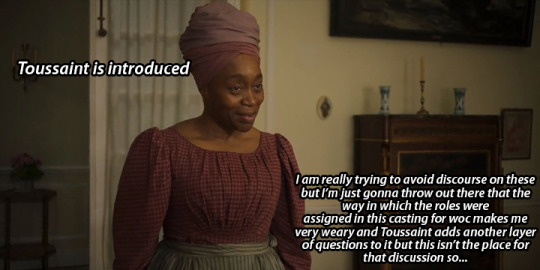
I know this show is casting in a general way as a suspension of disbelief of some historical facts and I’m all for diversity in casting in period dramas, regardless of anything else, if it’s allowing for representation in media.
But, at the same time, you need to be careful with your optics. She could have been cast as anyone else.
I don’t wanna go over this a lot because I don’t know enough about these parts of French history nor is it my story to tell, but the problem is in the erasure of conflicts or racism altogether as a way to prompt a shallow sense of diversity in a story that is directly linked with the subject of oppression.
Let’s continue with another similar optics problem involving “diversity” to exemplify this issue further, so that I can clarify.
This barricade had women on it and didn’t have Combeferre.
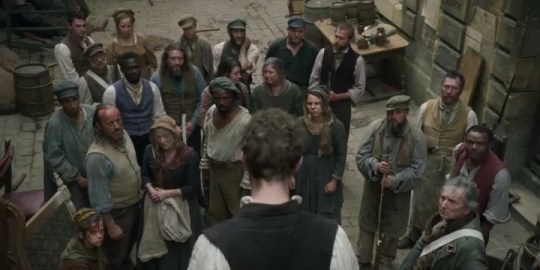
Now, here is the thing about that. In the barricade my man Combeferre gives an amazing speech about women and children.
In case you weren’t aware, the 1800s were the moment when European women and children barely started to be seen as separate members of society and not only “men but worse” and “men but small”. There are a lot of good articles about that, including one by Martyn Lyons about the new readers of the 19th Century, which changed the course of the editorial market, those being women, children and working class men, who didn’t have access to literature or literacy before that. The idea of childhood as we know it started then, and the later editions of the Grimm fairy tales was one of the first published books of fairy tales explicitly aimed at children’s education. And since a lot of us, in other places of the world that aren’t Europe, were colonized af or barely getting free from colonial governments in the 1800s, we kinda had to go with the flow, regardless of the social structure of native peoples, because colonialism sucks.
But you all came here for Les Mis so, let’s get back to that.
As this terrible and summarized dive into history implies, women and children were vulnerable to the fucked up state of social strife. Education was scarce and only accessible to some, employment was scarce and only accessible to some, food was scarce and only accessible to some. Most often than not, “some” did not include women and children.
In comes the the sun to my moon, Combeferre, with his speech.
He talks about all of this. Basically he talks to men who are the main providers of families, providers of women and children who depend on them and goes (I’ll paraphrase) “it’s our fault as a society that women can’t be here now, it’s our fault they don’t have the same possibilities and education we do, so at least do them a solid and don’t die today here if they depend on you to live, because the only possibility they have without your support is prostitution”. It was a fucking power move to include that on Les Mis. I mean, the entire book is a call out to the social and political situation, but damn.
So yes, there aren’t women there but the reason for it is that patriarchy sucks and the consequences would be disastrous for them.
Davies & co. pretty much didn’t give a shit about this. But, at this point, considering Problem #1, who’s surprised.
They removed Combeferre, his speech and placed random women on the barricade, as if nothing of that was going on and the patriarchy didn’t exist. Because ~diversity~.
The fact that they thought more woke to put some random women there on the barricade to die fighting instead of acknowledging the existence of sexism altogether pretty much sums up what this whole show thought diversity was.
For them, diversity wasn’t a political and social standpoint born from reality, a way to represent the dynamics of oppression that are at stake even on this day, but an aesthetic.
And, talking about speeches, let’s move on to the next bit.
Problem #4: Where are the politics?
1. The social and political landscape
Les Mis adaptations have a fluctuating balance with politics and social conflicts.
That is, at the end of the day, the very core of the existence of this story, the reason why still, to this very day, it is relevant and quoted, adapted and regarded is the fact that we still need it.
All of us, as human beings living as members of society, are always immersed in political decisions. It’s not only unavoidable, it’s part of our lives as people living together.
In the same way, the personal narratives of the characters of Les Mis are intrinsically linked to this landscape. They are set in different places of the social spectrum and hold different power dynamics and actions that relate to political standpoints.
Adaptations tend to work this in very different ways.
Some focus less on the politics and more on the social strife, with a greater focus on the characters. Others re-insert the characters in other different historical moments with the same levels of social and political strife. Others just copy-paste the situations and put them in another context, without really explaining what revolution it is, what they’re fighting for and why they’re being killed. The focus varies.
It seems, for how this adaptation starts, with Waterloo and a subsequent argument between Gillenormand and Baron Pontmercy about Napoleon, that politics are going to be important. This doesn’t last very long.
My biggest issue with the introduction of these circumstances is that they don’t bother on them but then attempt to use them for gratuitous self righteousness. It isn’t that they abandon them altogether, they overlook them but then attempt to use them for shock value.
There is a constant use of exaggerated, almost cartoon-y, stagings of social depiction:
- You have Gillenormand dining with his boys, in a luxurious and incredibly flamboyant scenery, while dissing political views in an almost comical fashion
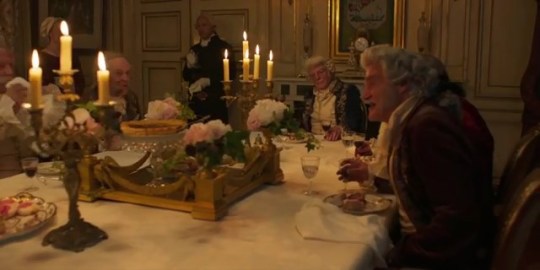
- You have beggars downright assaulting Valjean and Cosette on the street right outside the convent, as a means of shock to Cosette’s expectations of the world outside of it
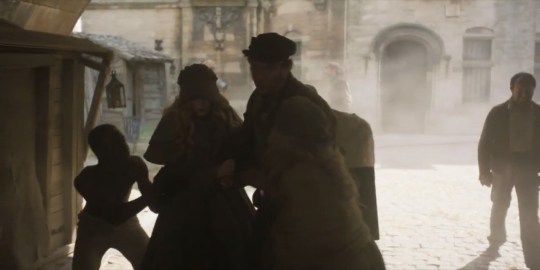
- You have Fantine’s entire sequences as a prostitute with higher and higher degrees of abuse
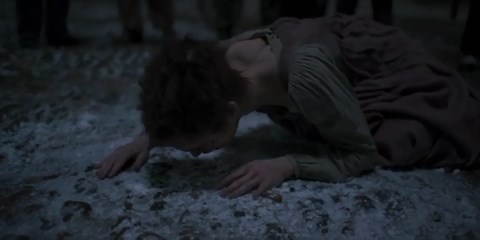
- You have the streets before the barricades, in some sort of confusing clamor that loses focus in favor of Valjean’s storyline
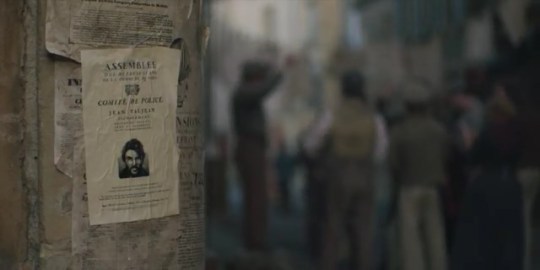
- You have a god awful last scene which attempts to say something socially compromising by showcasing the kids Gavroche was helping (I don’t think they’re siblings in this version), as a means to say “the revolution wasn’t successful and social strife will always continue” I guess, I don’t know, because it’s not like they gave a shit about it all before, so this kind of Perrault-ish moral of the story at the end makes no goddamn sense
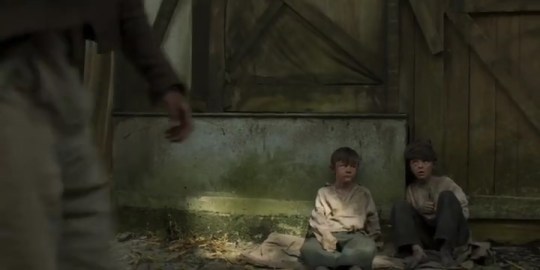
They are exaggerated snippets of things without context, with very little exposition, that are used more as props to shock than they are to actually take a stand on what the original story is trying to tell.
Even the reality Fantine has to suffer is blurred by the fact that the social situation isn’t seen as much as a reality in itself but a combination of Fantine’s “choices” and Valjean’s “guilt”.
But, in order to delve more into the non-political aspect of this adaptation, let’s focus on some specific characters.
2. Enjolras
Well, I’ve seen a lot of Enjolrai in my life (is that be the plural of Enjolras? yes? no? can it be?).
Enjolras has very different characterizations, even within fandom itself, but we can all agree that he’s a) highly political, b) highly committed to the cause and c) extremely charismatic.
And when I say “charismatic” I mean it in the sense that his speeches are so beautifully crafted, so certain and commanding, that you just wanna listen to what he has to say, regardless of your views. They’re political discourse but also very poetic, which is a very interesting literary opposite to Grantaire’s voice, but I digress.
Still, Enjolras doesn’t stand on his own.
He represents a part of a whole, an important part, but a part nonetheless. Les Amis are a very diverse mixture of individuals, and the main triumvirate represents different stances on the same political action that coexist together.
Without others to stand with, Enjolras loses context. Not because he can’t support himself as a character, but because his biggest value is within other people.
This Enjolras is confusing, angry and loses a lot of steam when most of the people who should be around him aren’t really paying attention.
Courfeyrac, although performed really well, doesn’t really get a chance to show his political ideas without Enjolras around, and that makes it seem like he’s being convinced to participate rather than doing it for his own reasons and being one key part of the group.

In the barricade, Enjolras acts as if he doesn’t know what he’s doing half the time, and the other half he doesn’t give a shit about killing soldiers, smiling and laughing while shooting people.

It isn’t just that the scene with Le Cabuc doesn’t exist, Enjolras doesn’t seem to have empathy, which is all given to Grantaire instead.
By taking away Enjolras’s vulnerability, his complexity, they make him seem more shallow overall, and in tow, make his cause lose importance.
And without a clear political standpoint, because his expositions about the situation are very shout-y and unclear, and his speeches are summarized with some actual quotes but without their meaning and true feeling, he seems to be fighting just because, rather than having strong ideals.
Enjolras in the brick is eloquent enough, humane enough, that you understand what he’s doing and why. This Enjolras is a mess that I couldn’t understand at all.
I don’t think people who have never seen, read or heard of Les Mis before will understand Enjolras as a character through this. He’s just a very angry student with weird facial hair (why?) who rants in a cafe while his friends are playing games and making jokes, who is friends with some workers and is the leader because he shouts the loudest but doesn’t seem to know what he’s doing.
And, worst of all, doesn’t seem to care for human life. Which brings me to the next bit...
3. Grantaire
Man, was I excited with this casting choice.
When I heard Turlough was playing Grantaire, I was delighted. And, at the end of the day, his performance was very good, but for a character who wasn’t quite Grantaire at times.
I mean, he wasn’t as off as Enjolras, but he was also so erratically written.
They decided to make Grantaire hesitant rather than a cynic. He didn’t get to express his cynicism or his attachment to his friends (what friends though? only Bossuet had a name other than Courfeyrac and Enjolras) and his involvement with the fight was shown as insecure rather than questioning of ideals.
He is shown conflicted when he decides to fight with them, he doesn’t have any of his long speeches, the Barrière du Maine scene or anything of the sort. He is just...hesitant about death, I guess. About dying and killing people. That’s his conflict.
This has, to me, two big problems attached to it.
First, it’s a simplification of the entirety of Grantaire’s thoughts. It’s taking the cornucopia of drunken philosophy that Grantaire’s voice in the brick represents and replacing it with a single fear, which while very valid doesn’t reflect Grantaire’s true extensive complexities.
Second, it takes away from Enjolras’s humanity. Enjolras is showcased as an indiscriminate machine of shooting soldiers while Grantaire is conflicted about having to do this and, in tow, makes Enjolras’s rejection of him when he leaves and gets drunk like a jerk move of an insensitive asshole.
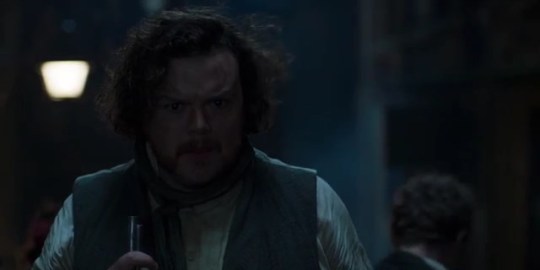
There isn’t a clear instance of Enjolras giving Grantaire a chance to do something before the barricade and Grantaire failing at it, with all the dominoes symbolism and all the stuff it implies. There isn’t a complementary set of complexities between each other. Grantaire seems to care about human life more than Enjolras does in this version, at the end of the day, because Enjolras’s speeches, even if carrying canon quotes, are inserted in a context in which he laughs while shooting people, knowingly sends Gavroche into danger and chastises Grantaire for being conflicted about human lives at stake.
So, instead of representing Grantaire’s true complexity as a character, they chose to give him something else that they think makes him more dimensional, when, in reality, takes away from his (and Enjolras’s) worth as a character.
All of this is very weirdly intersected with drunken jokes. Sometimes, the jokes and the behavior pays off and is inserted in good moments, sometimes they just don’t know when to stop and they kind of ruin their death scene with them, which is even worse considering it’s one of the few where they’re actually holding hands.
Overall, I think this was a simplification of Grantaire, in a way, a simplification which falls apart without a solid context to exist in. And it’s a pity, because Turlough was good.
4. Gavroche
The only reason I’d want an immediate new adaptation of Les Mis is so we can cast this same Gavroche in a decent one. He’s one of the best Gavroches I’ve ever seen, hands down.
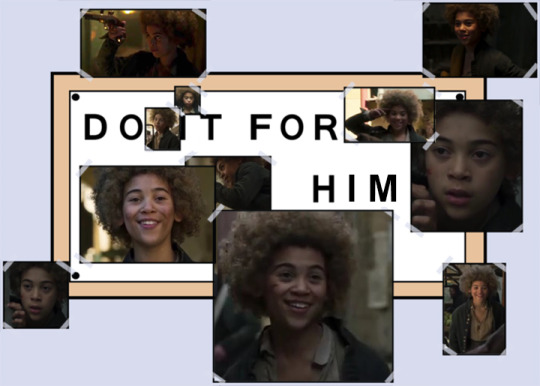
In this case, the problem isn’t with his interpretation or how he was written, necessarily, and all time frame and socio-political simplifications aside, the problem is in how the context reacts to him.
A lot of Gavroche’s agency is deleted in this version.
For starters, his age is kind of all over the place at the beginning. He’s fine by the time of the barricade, but before it’s kind of a mess. As a result, he lives with his parents for a bit longer than necessary and the few times we see him on his own, being his independent self, are in conflict with how his involvement in the main events come to happen.
It feels as if he’s been used in the barricade. When he’s off to find bullets, only Marius tries to get him back to safety, while the rest cheer him and laugh.
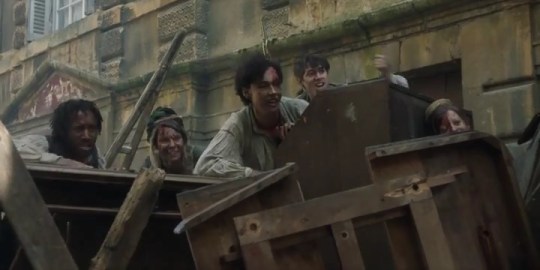
His character is well performed and we get to see his personality and his situation when he’s allowed to act on his own, but within the context he’s inserted in, he seems more like a prop than a character.
This makes it so that when he dies, you’re upset more so than sad. It doesn’t feel like a tragic circumstance born out of a lot of layers of social strife which culminate in a dead end for a kid who deserved a better life. It feels like every adult around him, every person he encounters, either neglects him, mistreats him or sends him into danger. It feels, much like with Fantine, like an easily avoidable situation.
And things get worse with this guy:
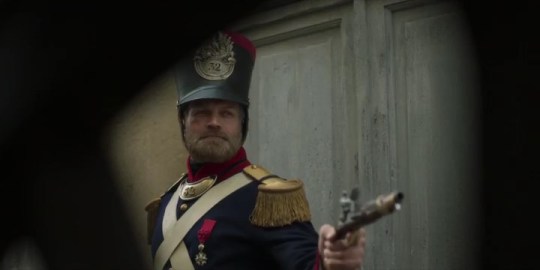
Like I said in my summary, this David Harbour-ish soldier is the one who is shown to mercilessly kill both Gavroche and execute Enjolras and Grantaire.

This is another layer in the modus operandi of an adaptation who uses social oppression and political strife as shock value rather than commentary and discourse.
By personalizing “evil” in one stern, mean, unreasonable, power-hungry soldier, they’re villanizing (and trivializing) the social context as a whole. It isn’t about how Gavroche got to that point, how we as a society failed so hard that he has to die in that way. It’s just one bad guy.
But then, they try to be fake deep about it, by doing that last scene with his brothers or by placing him alongside Mabeuf and Éponine but not explaining what that means, why those juxtapositions are socially relevant and important to the plot (maybe they don’t know why).


Overall, this was such a waste of a great Gavroche that I just feel really bad. Reece deserved so much better.
5. The barricade
Needless to say, this barricade was more of a mess than you would have expected.
The lack of proper introduction to the political landscape, the clumsy exposition, the out of context shout-y speeches and the erratic behavior of its characters, paired together with the fact that it ends about 1/4 into the last episode, giving more time to personal drama than any of what happens in it, makes it one confusing mess.
It’s also in the barricade where it’s super clear how visually similar this series is to the 2012 movie. A lot of visual choices are extremely similar, even when they didn’t need to be (Fantine’s and Cosette’s hair choices? the shots in the hulks? the scaled down yet very similar camera angles and movements during the entire fight? the color schemes of some particular scenes?), and it’s pretty heightened in this barricade.
Which I wouldn’t care about hadn’t they talked crap about the movie during their entire PR campaign.
Like I said, there were so many issues within the people involved in the barricade. With the women, with the characters, with the soldiers. There was also a very strangely set line between workers and students that they were very clumsy about setting yet didn’t get to do much aside from having the leader of the working class men leave when Enjolras prompted it.
By the way, Enjolras was a lot less convinced about the whole ordeal in this version, which made his characterization even more confusing.
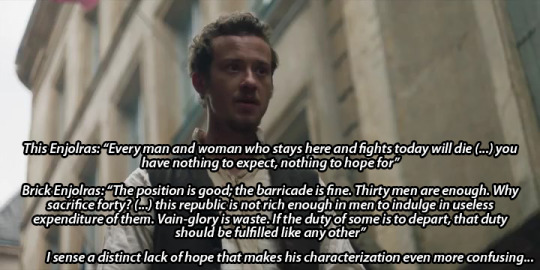
The barricade had a lot of messed up ingredients and not enough time to even simmer. At least the musical, which doesn’t have a lot of time dedicated to the students either, has Drink With Me, which doesn’t only serve as a way to characterize different students and their beliefs and personalities (“Is your life just one more lie?”) but also brings some melancholic change of pace, a pause between the action.
The highlight of this barricade, though, is Marius going apeshit with the torch.

But, all in all, there’s no much we can expect from a barricade born of confused ideas and even more confusing characterizations. This barricade feels less like a climax and more like a thing they had to do because it was in the book.
And don’t even make me talk about how they butchered my favorite speech. I’d rather not have it there at all, tbh.
Conclusion: A writer’s ego
We arrive to the end of this long and boring trip through my thoughts. If you’re reached this point, thank you for your time.
All in all, I feel like a lot of the issues of this adaptation stem from the fact that Davies thinks he’s better than everyone else and other men around him agree so much that they let him do as he pleases, without questioning anything.
I can’t really understand how you’re going through the script of this and see some of these choices (like the dress shop scene, the carriage scene and let’s not even mention the peeing in the park scene) and you go, and I’m quoting Shankland here:
“Andrew’s scripts made these characters feel modern. That was nothing to do with having them speak in a very modern way or changing their behaviour, he just found the humanity and earthiness of it,” Shankland says, recalling a scene in which Fantine and her companions urinate in a Paris park. “I thought, ‘Oh god, they’re going to pee in Les Misérables, that’s exciting.’” Source
That just sums it all up, doesn’t it?
After I watched this, I let some time pass. I watched all 3 fanmade adaptations that are currently out at this moment (back to back), revisited some of the ones I had seen before, read fics, read people’s articles and rants, looked into other adaptations on stage, from the classic ones to the more interpretative versions, and other current tv adaptations being done in other countries.
All of those things are vastly different. Some are more similar to each other, some are widely different, but they’re all different points of view on the same canon.
This is a canon that has some of the wildest possible interpretations coexisting. You can have a play centered on one specific character told through the songs of a specific album, a tv drama in modern times with a lawyer Valjean, a coffee shop au starring Les Amis, a parody comedy set in 1832, all happening at the same exact time.
And that’s great. That’s fascinating. That means this book is still alive because we need it still today.
Some days you’re in the mood for a heavily political adaptation which gives you goosebumps for setting canon in a context that is closer to your everyday reality, other days you just want all the Amis to live and have movie marathons cuddled together. It’s all valid.
But what all of those adaptations have in common is that they aren’t trying to be more than they are. They aren’t acting brand new, they aren’t pretending they’re re-inventing the wheel or that they are smarter than Victor Hugo himself because what Hugo didn’t know he needed in the “psychology of the book” was a soulmate au or a documentary series.
This adaptation, through what they said and how it was written, acted as if it was going to be the ultimate Les Mis adaptation to end them all. It presented itself as smarter than us all, as holding the keys to the meaning of Victor Hugo’s thoughts, as being able to fix his “mistakes”, fix other adaptation’s “mistakes” and deliver the best interpretation of canon possible.
And it managed to be a sexist, socially insensitive, problematic, un-political, homophobic mess.
Which, is a problem in itself, but even more so when the canon you’re adapting should be, first and foremost, against all that. It isn’t about how many brick quotes you use, it’s about channeling the soul of the story.
#les mis#les miserables#les mis bbc#les mis bbc a summary#jean valjean#cosette#fantine#eponine#marius pontmercy#enjolras#grantaire#gavroche#death cw#long post when expanded#luly rambles#bbc les mis
50 notes
·
View notes
Text
Power relations in His Dark Materials
TW: racism, eugenics, sexism, ableism
Spoiler warning: The main His Dark Materials novels, minor spoiler for La Belle Sauvage.
In the His Dark Materials novels power is a quite a central theme. Who has power, what do they do with that power, how can you fight power? This is of course also salient in our own world, which is why social theorists have been trying to explain power and power dynamics pretty much as long as social theory has existed. In this text I therefore want to look at some of these ways of explaining power and see if they can tell us anything about the universe of His Dark Materials (focusing on Lyra’s world). This will also dovetail with an analysis that I wrote a while back of the Nordic influences on His Dark Materials, especially regarding the history of racism and eugenics in Sweden and Scandinavia in general. Reading that text is not necessary to understand this one, but in the end of it I wrote:
Another thing I want to highlight is the comparison between the severing of children and dæmons, and sterilisation. In the books, children’s bond to their dæmons (their soul) are severed by the GOB [General Oblation Board] in order to prevent “Dust” settling on the children (Pullman 2007, 275). Dust is considered dangerous and sinful, something that according to the church started infecting humans after their fall from the garden of Eden. Sterilisation in our world, on the other hand, took place in order to make the population “cleaner” and of “better” stock. Groups who were in different ways considered degenerate were targeted, including women who were perceived as promiscuous/sexual transgressors. In Lyra’s world a spiritual connection is severed by the Church in order to curb sinfulness. In our world a biological connection is severed by “scientists” (in collaboration with the Church at times) to control sexuality and reproduction. There is a definite similarity here. (Lo-Lynx 2019)
In this text I want to further that argument by analysing the way sex, gender, sexuality and power functions in Lyra’s world. I want to thank the lovely gals over at Girls Gone Canon for helping inspire me to write both of these texts, and especially with this one because when Eliana mentioned Foucault in their latest episode a light went off in my head and I knew that I had to write this analysis (Girls Gone Canon 2019).
So, Foucault. Michel Foucault is perhaps one of the most influential theorists in contemporary social theory. His stuff props up everywhere. That unfortunately does not mean that it’s easy to understand. Here I want to explain some of his theories and concepts, and then apply them to the universe of His Dark Materials. One of the theoretical works that Foucault is most know for is his analysis of the history of sexuality (in the Western world) (2002). Foucault writes that contrary to the popular belief of sex being oppressed and tabu, people have always talked about sex, just not always outright. For instance, he writes about how admitting one’s sexual actions have become institutionalised first through confession (in church) and later by explaining ourselves to doctors/psychologists/scientists (Foucault 2002, 77). By confessing we feel that we become free, our secret truth has been let into the light. Foucault also claims that through these institutionalised confessions we contribute to the discourse about sex: “One pushes the sex into the light and forces it into discursive existence.” [my translation] (Foucault 2002, 56) Part of this discourse is that if we understand the “truth” about sex, we understand the truth about ourselves (Foucault 2002, 80). Sex is in this discourse considered a vital part of who we are. Now, what exactly does Foucault mean by discourse? Discourse, according to Foucault, describes the way society talks about a phenomenon but also how it does not talk about said phenomena (2008, 181). What is left unsaid. What is possible to say. Foucault also describes discourse analysis as a scientific method and claims that by analysing discourses one can understand why one statement was made in a situation, and not another one (2013, 31). He also claims that when we can see similarities between different statements, we can find a discursive formation (ibid, 40). Further he also writes that when analysing discourses, one should analyse who speaks (who has the authority to speak), from which institutions the discourse gains its legitimacy, and which subject positions individuals are placed in (ibid 55-57). Which position a subject is placed in effects their ability to inhabit different spaces (ibid, 58). Now, in his writing about discourses, Foucault mostly saw power as something unpersonal. Power existed in power relations between individuals in the discourse, and the discourse affected how individuals acted. Power as something unpersonal was a view that he kept, but in later writings he would analyse it further.
So, how does this apply to His Dark Materials? Like I explained previously, I see a definite parallel between how the Church/the Magisterium in Lyra’s world approach Dust, and how sex has been viewed in our world. The Church explains Dust by linking it to original sin. In their version of the Bible, when Adam and Eve eat from the apple of knowledge, they do not only become aware of their nakedness, their demons also settle (Pullman 2007, 358). And when demons settle (in puberty) Dust starts sticking to people. This can be compared to how the church of our world during the 5th century started propagating that the reason for human’s expulsion from the garden of Eden was because they had fallen prey to carnal desire (Mottier 2008, 19). Therefore, intercourse was tainted by original sin. In this way Dust is both linked to forbidden knowledge, sex, and sin. Like sex in our world, Dust is something that the Magisterium feel the need to investigate even though they find it dangerous and sinful (Pullman 2007, 361). If we use Foucault’s theory here, this is understandable. If Dust is a result of original sin, then it explains the inner nature of humans. Just as sex is considered to be a secret truth inside of us, Dust can be considered the same in Lyra’s world. Dust is something sinful, something that needs finding out, so it can be destroyed. But, when the scholars of Lyra’s world investigate Dust, they need to be careful to not commit heresy. I think heresy in this case could be considered to be the limit of the discourse. When scholars and others discuss matters of science and theology, they constantly need to act in relation to what would be considered heresy. Now, in our world the limits of discourse usually aren’t as overt, and at least in democratic countries you won’t be punished in the way the scholars risk being punished when they commit heresy. But in the way certain characters challenge the discourse around Dust, we can see what Foucault might call a discursive struggle. On one hand we have the discourse around Dust that gains its legitimacy from the Magisterium. On the other hand, we have challenges to this discourse from for instance Lord Asriel. He doesn’t have the same sort of legitimacy as the Magisterium of course, but in the beginning of The Golden Compass when he has his presentation at Jordan Collage, he tries to make his views legitimate by presenting scientific evidence (Pullman 2007, 26). Here one could say that he tries to appeal to the legitimacy of science, which seems appropriate when talking to scholars. Asriel here resist the power that be (the Magisterium), but he also resists the power in the discourse. Just as Foucault says, where there is power there is also resistance. It is through just these kinds of discursive struggles that Foucault sees society changing. Yet, the scholars of Jordan are notably scared of the Magisterium finding out about their part in this resistance. This leads us in to another theme in Foucault’s writings that I want to explain: surveillance.
One way that Foucault furthered his theoretical exploration of power was through did his writing on surveillance. He explains how surveillance works in modern society by likening it to a prison where one guard can observe all the prisoners from a guard tower, but where the prisoners can’t see the guard (Lindgren 2015, 357). Therefore they can never know when they are under surveillance. He calls this a panopticon, based on the description of such a prison by the philosopher Bentham. Foucault claims that the result of this is:
Hence the major effect of the Panopticon: to induce the inmate in a state of conscious and permanent visibility that assures the automatic functioning of power. So to arrange things that the surveillance is permanent in its effects, even if it is discontinuous in its action; that the perfection in power should render its actual exercise unnecessary… (Foucault 2012/1975: 315)
That is to say, the prisoner feels like they are constantly under surveillance, even if this is not actually the case. In that way the prisoner will obey the powers in charge, so that practical/physical power is not necessary. Foucault claims that this is the case in society as a whole; we know that we could be under surveillance all of the time, and therefore we behave in accordance with that (Lindgren 2015: 359). This turns us into docile bodies that can be used productively in society, since we unconsciously behave like the power wants us to (even when the power isn’t a clear individual or group). Other writers have also used Foucault’s theory on surveillance and his concept of docile bodies to analyse how this affects the gendered body, specifically the feminine body (Bartky 2010).
In Lyra’s world this surveillance is perhaps even more overt than in our world. People are seemingly very aware that their every move could be watched by the Magisterium. This theme is even more present in Pullman’s novel La Belle Sauvage that also takes place in Lyra’s world (Pullman 2017). I won’t spoil that novel too much, so I won’t go into that theme further now, but parts of it very much paints society as a panopticon. Now, what consequences does this have? Well, it mostly makes most people in Lyra’s world just go along with what the power wants. Some does it because they are aware of the constant surveillance, others have internalised this surveillance and does it unconsciously. One aspect of this that I want to explore further is the way it effects gender and gender expression in Lyra’s world. In the chapter in The Golden Compass when Lyra first meets Mrs Coulter, she contrasts Mrs Coulter to other women academics that she has met (Pullman 2007, 69). In comparison to them Mrs Coulter seems refined, glamorous, precisely what a woman in Lyra’s world should be. Women should be pretty, and, tellingly Lyra thinks the female scholars are both boring and less fashionable. The materiality of the body is here connected to other assumptions of gender, such as women scholars being less accomplished than men. In the patriarchal world of His Dark Materials, women who try to integrate themselves in male institutions are very frowned upon. Later, in The Subtle Knife, when Lyra has learned that all that glitters isn’t gold (such as golden monkeys), she still has this internalised view of what a women’s body should be like. When she has to find new clothes to wear and Will suggests some pants she refuses, claiming that girls can’t wear pants (Pullman 2018, 56). Here she has internalised the surveillance of the power structure that effects how women will behave. No one from Lyra’s world is there to tell her that she, as a girl, can’t wear pants, she monitors her own behaviour. This is just one example of many where one can see how the constant surveillance makes people in Lyra’s world, just as our own, internalise that surveillance.
One final part of Foucault theories that I want to explain is the concepts of biopower and biopolitics. Foucault writes that while at previous times in history regents such as kings and queens have had the power over their subjects’ life or death directly (such as by capital punishment), today the state’s power more lies in the power to support lives or let them perish (Foucault 2002, 137 & 140). He describes our current time as one of biopower, where the state controls our bodies to make them as efficient/productive as possible for capitalism (ibid, 142). Foucault also writes that because of this, norms has in part replaced the law, or rather that the law has become the norm, and therefore people doesn’t always have to be threatened by legal consequences in order to behave (ibid, 144). A state that wants a productive population doesn’t want to have to threaten them with death every time it wants to control them. This can obviously also be thought of in terms of the panopticon and surveillance that I described above. But Foucault also writes that since sex is considered so important in society, that is also one of the most controlled things (ibid, 146). This control takes place both on a micro level by doctor’s appointments, psychosocial tests etc, and on a macro level by statistical measurements etc. If this sounds similar to the way eugenics tried to control the” health” of the population, that is no coincidence, Foucault cites this as the most extreme example of these biopolitics (ibid, 148). It might also be worth noting here how other theorists has expanded this by writing about for instance “the bio-necropolitical collaboration”, and how inclusion or exclusion of certain bodies/people in society indirectly produce life and death (Puar 2009). Certain bodies get support to live and thrive, while other bodies (such as disabled bodies or bodies from the global south) is not considered worth to invest in.
Now, if we have established the link between Dust, sex and sexuality, then we could apply Foucault’s analysis of biopolitics on the Magisterium’s attempt to control Dust. In the Golden Compass we can see this through the General Oblation Board’s work on severing children, to make them not infested with Dust (Pullman 2007, 275). Like I’ve previously mentioned, one can see a link here to sterilisations, one extreme form of biopolitics that are aimed at controlling the sexuality of the population. It is also interesting to note here which children, which bodies, are being experimented on. Like I established in my other analysis, this is mostly lower-class children and children of ethnic minorities. This seems like a clear example of how the bio-necropolitical collaboration that Puar writes about decides which bodies should be protected, and which are disposable. Another example of biopolitics can be found in The Amber Spyglass when The Magisterium tries to prevent Lyra from being an Eve 2.0. Like Mrs Coulter says:
My daughter is now twelve years old. Very soon she will approach the cusp of adolescence, and then it will be too late for any of us to prevent the catastrophe; nature and opportunity will come together like spark and tinder. (Pullman, 242)
They need to control Lyra’s blossoming sexuality in order to control Dust, and the possibilities of free thinking. Mrs Coulter prevents The Magisterium to take control over Lyra, because as she says:
If you thought for one moment that I would release my daughter into the care, the care! , of a body of men with a feverish obsession with sexuality, men with dirty fingernails, reeking of ancient sweat, men whose furtive imaginations would crawl over her body like cockroaches, if you thought I would expose my child to that, my Lord President, you are more stupid than you take me for. (Pullman, 243)
Here we again see the connection between controlling Dust and sexuality, specifically female sexuality. Such a focus on female sexuality often existed within our world’s eugenics as well, since women were often seen as the reproducers of the nation (Mottier 2008, 90). Statistics show that 90% of sterilisations being carried out was on women in both Switzerland and Sweden. As Mottier writes:
Female bodies were a particular source of eugenic anxiety, as indicated by the gender imbalance in the removal of reproductive capacities. Reflecting traditional associations of reproduction with the female body, women were also seen as particularly important targets for the eugenic education and state regulations that eugenicists called for. As sociologist Nira Yuval-Davis has pointed out, ideas of the ‘purity of the race’ tend to be crucially intertwined with the regulation of female sexuality. (Mottier 2008, 92)
That it is specifically a girl’s sexuality that the Magisterium wants to control seems depressingly fitting in this light.
So, in conclusion we can see that the Magisterium considers Dust to be something that needs to be controlled. This partly happens through discourse, partly through surveillance, and partly through biopolitics. In many ways we can see how this parallels the way sex/sexuality is conceived in our world. Now, I’m not sure how much of this was deliberately put there by Pullman. Perhaps he didn’t intentionally make Dust a metaphor for sex/sexuality. But the way he connects it to original sin, puberty, temptation etc, makes me think that at least some of it was on purpose. Lyra’s world is not that different from our own after all.
References
Bartky, Sandra Lee. (2010). “Foucault, Femininity, and the Modernization of Pathriarcal Power.”, pp. 64-85 in Weitz, Rose & Samantha Kwan (eds). The Politics of Women's Bodies, New York: Oxford University Press.
Foucault, Michel. (2002/1976). Sexualitetens historia 1: Viljan att veta. Translated by Birgitta Gröndahl. Göteborg: Bokförlaget Daidalos AB [This is the Swedish translation of L'Histoire de la sexualité I : La volonté de savoir/ The History of Sexuality I: The Will to Knowledge]
Foucault, Michel. (2008). Diskursernas kamp. Eslöv: Brutus Östlings bokförlag Symposion.
Foucault, Michel. (2012/1975). ”Discipline and Punish”, pp. 314-321 in Calhoun, Craig, Josepth Gerteis, James Moody, Steven Pfaff & Indermohan Virk (eds), Contemporary Sociological Theory (3rd edition). Malden, MA: Wiley-Blackwell.
Foucault, Michel. (2013/1969). Archaeology of knowledge. New York: Routledge
Lindgren, S. (2015). ”Michel Foucault och sanningens historia”, pp. 347-372 in Månsson, Per. (eds.), Moderna samhällsteorier: Traditioner, riktningar, teoretiker (9th edition). Lund: Studentlitteratur.
Lo-lynx. (2019). “The Nordic influences in His Dark Materials” Accessed: December 1, 2019. https://lo-lynx.tumblr.com/post/189230180712/the-nordic-influences-in-his-dark-materials
Mottier, Véronique. (2008). Sexuality: A Very Short Introduction. Oxford: Oxford University Press
Puar, Jasbir K. (2009). “Prognosis time: Towards a geopolitics of affect, debility and capacity,” Women & Performance: a Journal of Feminist Theory, 19:2, 161-172
Pullman, Phillip. (2007/1995). Guldkompassen. Stockholm: Bokförlaget Natur och Kultur [this is the Swedish translation of The Golden compass]
Pullman, Philip. (2018/1997). The Subtle Knife. New York: Scholastic.
Pullman, Phillip. (2001). The Amber Spyglass. New York: Random House.
Pullman, Phillip. (2017). La Belle Sauvage. New York: Knopf.
1 note
·
View note
Text
Gormless Ch. 5 - Try to kill my boss? Haha you kids are alright!
A well-meaning friend gave me a book series that is hilariously bad. The first book was Souless and my riffs were entitled brainless. This second book is entitled Changless and these riff are then gormless.
I mean to say I have entitled them gormless! Not that my riffs are dumb, and the effort I spend on them stupid since I’m the only one who enjoys them. HAHA!
The story is SUPPOSED TO be about how a badass lady wearing a rad-looking carriage dress hits baddies with her umbrella and bangs her hot werewolf husband. In reality it’s mostly poor attempts at being witty, flirty, and superior.
For the last book check out the brainless tag.
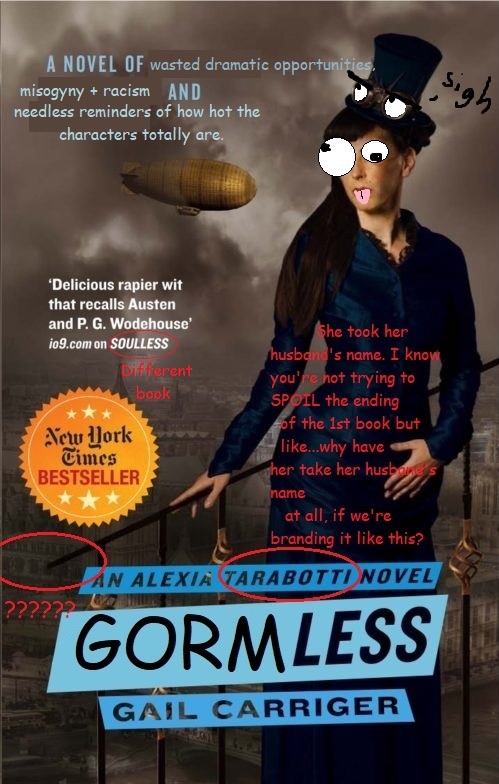
If you want the TL;DR version but want to read these new riffs anyway?
This story is set in supernatural Victorian steampunk England. Alexia is our NOT LIKE OTHER GIRLS protag. She is a soulless, which means she’s able to negate the abilities of vampires and werewolves by touching them. She’s recently married a big oaf, named Lord Connel Maccon. He’s the manchild in charge of the supernatural police with a zillion dollars and he’s totes super hot too ok. Their relationship is mostly arguments about how Maccon can’t tell her fucking anything. Alexia has also recently become head of ~Soulless affairs~ in Queen Victoria’s government. She has a dumb friend named Ivy, a gay vampire friend named Akeldama, a family who’s evil because they do the same shit as her but while being blonde, and most importantly Alexia is better than everyone cause…cause.
Last time on Gormless:
There’s some mysterious force that’s turning the Vampires and werewolves into humans. Alexia is in charge of figuring out that deal, and she is doing a bad job at it. Her husband is in charge of the Supernatrual Police (BUR) so he’s going to Scotland about it.
There’s a hot werewolf guy into Alexia called Channing and he’s a big jerk. Ivy is getting married to some rich slub, even though she’s in wub with Maccon’s servant Tunstell. Alexia just met a hot lesbian named LeFoux and wants to take her to visit her smart Vampire gay bestie Akeldama.
Chapter 5 – Try to kill my boss? Haha you kids are alright!
This chapter opens up with her seeing Lord Akeldama. Basically they start by inviting Madame LeFoux and just catching up. Turns out Akeldama has not seen the humanization phenomenon before even though he hella old, but his scouts discovered a military ship called the Spanker had people from the Kingair clan aboard who were humanized. We got similar info before, but there’s an implication that the humanization is traveling directly with the people of the Spanker. There’s the implication that it’s moving north, and it has to do with the dead alpha thing.
Something also of slight interest is that Akeldama tried to ~recruit~ Channing back when Channing was human. That Channing, so they say, used to be a charming sculptor and vampires and werewolves were fighting over him. That he went into the military/werewolfism cause it was more ~romantic.~ I think that’s all there just to put Channing back on the table as a love rival.
HE’S BAD RIGHT? BUT LIKE MAYBE NOT ALL BAD?
On one hand they’re fleshing him out. On another hand it reeks of Marty-Stuing and it is not convincing me he deserves another chance.
Well what would make him desirable to you Faps? Put him in an oversized sweater, with glasses, and he’s petting a cat?
Okay okay! My kink is valid and so is the kink for a man-child meathead okay. I just wish my kink was more main-stream gosh.
So Madam LeFoux shows up and there is a brief bit of sassing between Akledama and her before Akeldama has to show off his aethographor. They spend a lot of fucking time on this. I guess this is for the folks into the steampunk aspect but like…I don’t really understand this appeal. It basically boil down to it’s a telegraph machine but it prints letters onto metal with caustic chemicals. It has to be manned at all times, and some old ones need specific ~ Crystalline valve frequensors~ to communicate to one another but Akeldama’s LATEST EDITION doesn’t need it. I am a history nerd and reading about old machines is fascinating because you get to see how the machines have impacted the culture. I also like reading about Sci-Fi technology because either it’s cool to see what people decades ago thought was going to happen, or speculative future possibilities. In theory speculative fiction about an alternate universe’s history could be cool but this machine is just not that far removed from a telegraph machine and sounds like it’s a pain in the ass. But perhaps I’m just so spoiled by the fact that I could get a snapchat of a strange person’s butthole from Australia instantaneously without having to operate a machine the size of a room 24/7. You have not truly enjoyed a stranger from down under’s…down under until you’ve seen it with the leopard ear snapchat filter!
Anyway he gives Alexia a ~ Crystalline valve frequensor~ with his frequency just in case. She puts it in a pocket on her umbrella and it’s like DAMN GIRL WHY DIDN’T YOU LEAD WITH THE FACT THE THING HAS POCKETS? THAT’S WAY COOLER! (Even if impractical for regular umbrellas.)
The three of them part ways, Alexia is planning on taking a dirigible to Scotland in order to face this humanization and save her dumb-fuck husband.
Here we switch point of views to look through Lyall’s eyes. He’s tailing Alexia for reasons and some vampires are sneaking around Lord Akeldama’s place while she was visiting. The vamps almost attack Alexia but Lyall stops them with some pow pow action. The vampires say they were just going to ~test~ Alexia and Lyall is just like haha that’s fine, go home you kids! Also Alexia did not notice any of this.
I mean I’m kinda glad we had a bit o’ action but this was dumb. Lyall just lets these two jackoffs go after they tried to maybe kill/kidnap/whatever his master’s wife. Also he doesn’t tell Alexia she was nearly attacked? Cause drama later on I guess? Fuck this writing! I take back the nice things I said about Lyall! Lyall instead just argues that Alexia shouldn’t go to Scotland. Sure Maccon relies heavily on his superpowers for everything, but not letting him know his powers are going to be suddenly taken away by a mysterious force which maybe out of his blood will definitely be fine. I guess because it’s now Lyall’s policy to make sure everybody around him, whom he attempts to protect with his life, is unaware of the danger around them. Cool, cool.
At least this time when Alexia badgers somebody about something she’s going to do, she’s right that it makes no sense why she shouldn’t. However she unwittingly has to take along a merry batch of fuckers. You’ll hear about them in a bit.
We have a big old scene where Alexia’s mother shows up and is like, “YOUR ONE SISTER IS GETTING MARRIED THE OTHER SISTER IS SO WRACKED WITH JEALOUSY SHE’S MAKING EVERYONE MISERABLE! YOU TAKE HER!”
Oh and there’s this inconsistent writing here where Alexia’s mother is passive aggressively racist toward werewolves and Scots. Yet at the same time there are lines about how pleased Alexia’s mother is that she married a Scottish werewolf. There’s the direct line, “It was a constant source of amazement to Alexia that the only thing she had ever done in her entire life that pleased her mama was marry a werewolf.” I think what the author is trying to say is that Alexia’s mom was happy that Alexia married a rich and powerful man, and LOOKS PAST the fact that he’s a werewolf but still kinda hates werewolves. However they don’t bring up that her mom is impressed with all her money and power. They just keep saying WEREWOLF THIS and WEREWOLF THAT! They made it unnecessarily muddled here and it’s confusing, annoying, and could have been easily fixed.
In Alexia mother’s defense the only thing I’ve seen Alexia do that’s pleased me, is hit that douche werewolf over the head a bunch.
So of course, Alexia’s mother won’t take no for an answer when it comes to her sister. Therefore Alexia is saddled with generic shallow, petty, bitch blonde sister #2. Felicity, the blonde in question, agreed to this, despite hating her sister cause she knew her sister would be surrounded by hunky werewolves. SHE GOTTA GET A HUSBAND NOW TOO! IT’S ALL US LADY FOLKS CARE ABOUT! Due to English custom you can’t just leave your sister in your castle to have wild gangbangs with werewolves all day and night. But I mean, considering the amount of misogyny the 3rd in command is packing? Not leaving her alone there is probably a good idea. (Also I will puke blood if Felicity and Channing become an item.)
Ivy shows up at this time as well cause I mean…Ivy has always been sexually drawn to inconvenient timing. Don’t kink-shame her! When Ivy hears that Tunstell will be going on the Dirigible, she pouts until Alexia just let’s her go along too, cause HAHA WHY NOT AT THIS POINT!?

(A gif of Hillary Clinton laughing and throwing her hands up.)
So she’s taking Angelique (to dress her), Felicity (to be obnoxious in the bitchy way), Ivy (to be obnoxious in the ditsy way), and Tunstell (cause this 90lb actor will protect them all.)
OH BOY WE GOT A SMORGSEBORG OF IMPENDING WACKINESS TO CONTEND WITH! IS THAT EXCITEMENT I HEAR OR THE CRACKING OF MY OWN GRINDING TEETH!?
Say something nice Faps:
Dang I’m having a hard time saying nice things here that aren’t simply just, “Well at least X didn’t happen!”
She uhhh tried to steampunk?
I get a masochistic tickle when Alexia’s family is around. I dislike Alexia so I like seeing her insulted, but the cartoonish villainy of her family is hilarious to me. It’s just so spot-on, the archetypal “BASIC SHALLOW BLONDE BITCH-SLUT TO MAKE PROTAG LOOK BETTER THAN ALL OTHER GIRLS!” However I have yet to see an author fail so spectacularly at differentiating the evil girls from the protag. “I can’t believe all my family cares about is how they look, their social standing, and men!” Huffs Alexia, as she ponders her own romantic dalliances to the king of the Universe, in her new blue carriage dress, which has SHOOK the London fashion world to its VERY CORE!
1 note
·
View note
Text
Lalnah Dearth - Hopeless Romantic
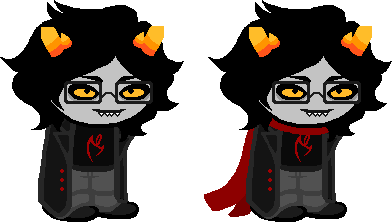
@chaoticevilfantrolls
(Breaking the streak of Teals I had going, here’s my Main Boy)
I gotta say, you’ve hit another one out of the park. I really love this boy from the get-go.
Planet: Alternia. Same AU as Lycosa and Vapula (age of conscription is 10 sweeps, minor social changes, etc.)
Name:Lalnah Dearth
Lalnah: Comes from Lana or Svetlana, a name which typically means Light, or Gift to the World, depending on the source. Also, in a more blunt and lowbrow manner, it’s a pun on ‘lol, no’.
Dearth: Meaning ‘a lack of’. A lack of light, of prospects, and of hope. It primarily ties into his dreary nature, and the fact that he is meant to be a void player at his core.
I’m tempted not to use Dearth if only because it Is straight up a highly recognizable word. I like it a lot thematically, though. Hrm… Maybe if we just translate it? Duurte, meaning dearth, scarcity… Lalnah Duurte.
I do have to point out here that void isn’t about a lack of prospects or hope so much as an empty space… which I do really like for him. It’s the unexplored, the unknown, the blank canvas, the vastness, the beginning, that which isn’t but can become… Which can be really overwhelming and oppressing and lonely. But it’s not hopeless, even if it can feel that way in the beginning. Which I think ties beautifully into the title ideas you discussed, but we’ll get to that at the appropriate time.
Age:Typically 9-12 sweeps. He’s a little older than the rest of his friend group.
Strife Specibus: shotgunKind. It’s a reference to the original instance of Chekhov’s Gun, in which a shotgun over the mantle piece, mentioned off-hand in one of the earlier chapters of a story, was used as a murder weapon in the climax. It’s an important literary concept (not adding superfluous details unless they become relevant later), which ties into his writing theme as well as his plotline in the session he’s from.
I Love That Thanks. I was going to make a pen/sword joke here but I can’t when the Chekhov’s Gun reference is already perfect.
Fetch Modus:Hangman Modus. Lalnah needs to play hangman to retrieve the item from his sylladex. The phrase or word is always based on the item itself, becoming more complex the more powerful or important the item is. If he loses, the item is locked for a five hour period.
Blood color:Burgundy. His particular brand of down-trodden resignation fits really well in the lower castes, I believe. Plus, burgundy is the name of a kind of wine, which fits extra well with his alcoholic author theme.
I definitely think so. It puts him in a really vulnerable social position that amplifies that ease of manipulation you mention later. I think it’s also an interesting assignation for an author because of the rust leaning towards adventure. I like the idea of him exploring more internally, through his art.
Symbol and meaning:The Dele. It’s a symbol used to mark something for deletion in editing manuscripts. Primarily ties into his status as a void player, as well as his extensive writing theme. Also, when drawn a certain way, it resembles a bat.
Oh I just love this… I might have to adjust it a little to account for rust language, but we’ll cross that bridge when we come to it.
Trolltag: transientTechnicality
Transient: Something or someone who is temporary. Can be used to describe someone who is homeless or nomadic.
Technicality: A small detail in a set of rules. In Lalnah’s mind, a technicality is something that is easily overlooked, but can be used to win major battles in both law and war.
Quirk:He starts all of his statements with an arrow pointing to his words, as if drawing attention he can to what he’s saying. (->)
He capitalizes his Os, and his v’s become >’s, but otherwise types entirely in lowercase. This is primarily to show his manner of speaking (very empty and almost monotonous, with a bit of a lisp around the sound of V). He uses punctuation within statements, but does not use apostrophes or periods as ending punctuation.
He has a tendency towards long, elaborate statements, spliced with commas and filled with florid and bloated prose. Expect a lot of ‘woe is me’ shit.
When he does use emoticons, he typically uses -w- for just about every emotion possible, using it to represent a bat’s face. Sometimes he’ll add carats before and after to represent perked ears (and curiosity), sometimes he’ll add an apostrophe as a sweat drop of exhaustion or weariness. (^-w-^ or -w-’)
“TT: -> cwm fjOrd bank glyphs >ext quiz”
“TT: -> if yOu need a better translatiOn, the wOrds amOunt tO sOmething meaning, cOllOquially, symbOls car>ed On the mOuntain hOllOw irritate an eccentric”
“TT: -> yOu, ah, wanted tO see every letter, thOugh… -w-”
I Adore All Of This. It’s interesting that you’ve given him the arrows drawing attention to his text when he’s themed around void/light. Maybe when he’s feeling particularly small and lacking in confidence and when he’s especially afraid of bringing attention to himself, he drops the arrows.
Special Abilities: Lalnah used to have a decent, if not exceptional, talent for photokinesis and photogenesis, which he could use to control and create light. Primarily he would use this for non-combat things like making reading lights and faerie lights or changing the intensity of light around him, although when pushed to it he would use the light to disorient foes so that he could escape. His drinking has severely dulled these powers, though, to the point he almost can’t use them at all.
Additionally, Lalnah hears the horrorterrors of the furthest ring, primarily manifesting as a dull mental static which he cannot pick out the meaning to. He hears them through his dreamself, which is sleepwalking in perpetuity, except while he himself sleeps. Because of this, he doesn’t necessarily have nightmares while he sleeps outside of sopor, and he’s more resistant to mind-control and telepathic psionics, if only for the barrier that makes it painful to dig too far into his pan. It doesn’t help much, because his timid nature makes it easy enough to control him in other, more mundane means.
Although not psychically based at all, Lalnah is also capable of using echolocation, thanks to his big ol’ sensitive batty ears.
I love all of this, too! I keep saying that but god I really do adore all the little clever details about him. He’s so well-crafted. His photogenesis would be so handy. He could cast light however he wanted while writing a scene to better figure out how to describe it… I wonder why he started hearing the horrorterrors, though? Do they just have a particular fondness for him? Something about his aspect bleeding before the bounds of sburb and into his consciousness?
Or did he dig a little too deep while doing some research for a book? Dip a little too much into the unknown and unlock something in himself he maybe shouldn’t have? The blankness of a page can be dangerous in that way.
Lusus: A fruit bat approximately the size of a house cat. Lalnah’s lusus is rather sickly and frail, and has been most of his life. In fact, by the time of the session, his lusus is typically dead of some illness. His lusus is a fruit bat primarily for the fact of Lalnah’s nearly vampiric appearance, the concept of being ‘blind as a bat’ (which Lalnah most certainly is), and an artifact reference to cannibalism (not nearly as relevant anymore, but Lalnah as a character is about 4 years old and I still haven’t weeded out all of the lingering teenage angst).
I do like the cannibalism reference objectively because he is, still, in some ways, self-cannibalizing. On a more emotional and identity level but still.
Personality: By all means, Lalnah is about as timid and self-pitying as a troll can get without it bordering on the obscenely pale-pornographic. He lets others speak over him, letting them form their opinions on him without so much as a whimper of protest. He has a(n earned) reputation as drunkard and a hopeless fool of a romantic, which he no longer attempts to protest. He’s been caught using his horns as a bottle opener. There’s no recovering your reputation after that.
In reality, Lalnah is incredibly talented, with strong skill in games of strategy and forethought, as well as proficiency with playing violin and piano. He avoids bringing attention to these things in fear that they will be used as a reason to manipulate him and take what little agency he has. This fear isn’t unfounded, but rather borne of his relationship with his ex-moirail, a blueblood who used his talents to make herself look more favorable, using recordings of him playing instruments as her own and forcing him to fit some visual ideal that she thought was fitting.
He has the tendency to fall in deep, profound love with trolls who show him the smallest scrap of kindness despite his failings, opening up to them and showing only them his real talent and potential, no matter how much he comes to regret it later.
He tends to wrestle with perfectionism in addition to his need for passive mediocrity. His drinking, unfortunately, is the only way he knows to bridge between the two. Using his drinking as an excuse for his failures soothes the savage beast of perfectionism without forcing him to give up his sense of safety in being unremarkable.
I like the idea of him kind of idolizing the people he’s in love with. And then true to Aries-aligned form experiencing these cycles of disappointment when they don’t meet these expectations. But he keeps on loving anyways, clinging because of his self-pity. Maybe having a fear that if he loses This person he’ll never find love again. Wants to have a perfect love but he can’t stand up for himself in relationships or dedicate himself to even trying to change people.
The drinking is also very fitting. We have seen pretty often that addiction is a very light/void phenomenon. Roxy’s and Rose’s own alcoholism, and Equius and Vriska’s addiction to breaking specific objects… An unfortunately realistic way that people attempt to cope with these internal conflicts.
Interests: Lalnah’s primary interest lies in writing. Be it prose or poetry, political essays or pining exposes, he writes whatever he happens to be in the mood for, and with great proficiency. Even in his trademark stupor (which he no-doubt exaggerates), he writes.
He has an interest in cooking as well, treating it as an art-form as high as any other. It’s one of the only things he’s willingly held on to since his moirailegence with the blueblood, besides perhaps his fashion sense. He absolutely has made a romantic dinner for his moirail out of instant noodles, and his habit of making the most of nothing really shines through in that.
Otherwise? He’s shoved aside most of his other interests. He doesn’t enjoy playing the piano or violin anymore, and his smaller hobbies that were discouraged or ignored fell to the wayside when he started hitting the bottle with some regularity.
)^: I want to save him.
Title: I’ve been struggling with this a little bit, but for a very specific reason.
Part of me is drawn to making Lalnah a Mage or Seer of Void, for his deep understanding of nothingness and mediocrity, his greater-than-average knowledge of the horrorterrors and the way they work (if marginal), as well as smaller things like his use of echolocation and the fact that he’s nearly blind thanks to his shitty eye sight.
Part of me is drawn to making him an Heir of Light, who spends most of the session in an unhealthy state of inversion, who then reverts to his proper classpect at a key moment, forcing himself to take on and handle the talent and relevance he’s been denying.
I do like the idea of him being an Heir of Light a lot. A Lot. He can easily start and spend a large part of the session inverted to Mage of Void. He hears the voices of the horror terrors and understands the unknown and the blank, or at least Believes he does. As he starts to come into himself and his role, he gets to learn to understand himself and information and the nature of infinity far better than he ever believed he did.
He takes on the relevance he’s been denying and that he has earned and would passively be able to manipulate and change information, the known, the present, as well as luck. And he would learn to actively comprehend the boundlessness of the void. He’d take all this passive change and this light inside himself and use it to understand that emptiness is not a dead end but instead a chance to fill it up with beautiful things.
Land: Land of Echoes and Haze
His land is a sprawling port town, worn down and rusting, the air thick with salt and haze. Think Innsmouth from the H.P. Lovecraft Mythos. His consorts are salamanders, dull grey in color, and are surprisingly hostile to him, although not aggressive. They speak endlessly about the things that hide in the mists, urging him to leave the land and never come back.
Consorts begin disappearing as he continues on his quest, and it’s eventually revealed that the things in the mists are actually mutated consorts, ruined by the whims of his denizen, Dagon. Lalnah must complete some tasks to drive back the mist before bargaining with Dagon to turn the consorts back into the form they are meant to be in.
I love that because it really does imply him needing to take on the spot light, pick up the hero role, make a change passively, by convincing the Dagon. He’d probably have to do something with a fun loophole to bring in your Technicality trolltag. Make a contract and screw that denizen over, Lalnah. Overcome your base acquiescent nature. I believe in you.
Dream Planet:Derse. He’s a voidy boy, and has a lot of horrorterror influence to him. It’d be a waste of a good plot point.
Oh Yep it’s definitely the most thematically fitting And he has So much internal conflict it’s impossible not to consider him a derse player.
Design stuff!:

Yeah I had pretty much almost nothing to add here. Like quite literally almost nothing.
Teeth: We’ve only seen one rust with visible teeth and even then they were nubby teeth, so I took the points off his fangs. I think it also works better for his submissive and dulled behavior.
Symbol: It needed to be symmetrical to meet the rust sign language, so I worked with the idea of it looking a bit like a bat and added two equally lengthed wing edges. I also wanted to use a lot of negative space because Themes.
Shoes: I changed the outline to a lighter one because the dark outline looked a bit awkward.
This is a really amazing and well-thought-out character! I hope I was able to provide even a little bit of useful help haha. Thank you for sharing!
-CD
#chaoticevilfantrolls#lalnah dearth#lalnah duurte#lalnah#dearth#duurte#rustblood#maroonblood#burgundyblood#review#redesign#?#not really. it's really not a redesign#cd review#submission
7 notes
·
View notes
Text
September 12, 2021
My weekly roundup of things I am up to. Topics include learning curves, Telosa, the fine-tuned universe, and some anniversaries.
Learning Curves
Last week I commented on Matt Clancy’s site, New Things Under the Sun, and in particular the material on fertility rates. It is meant to be “what academics generally believe” on questions related to innovation. The site is chock full of good material. This time I’ll comment on his work on learning curves. See in particular this and this article.
A learning curve, also known as the “learning-by-doing” phenomenon, is the idea that the cost of producing a product goes down as more is produced. This makes intuitive sense. As production goes up, we would expect more workers to be trained to be efficient, for companies to optimize their production processes, for more efficiency techniques to be discovered, and so on.
The empirical evidence is fairly strong too, or at least it appears to be. Learning curves are also known as Wright’s Law, going back to a paper by Theodore Wright in 1936 where he observed that for every doubling of airplane production, the cost goes down by 20%. There are numerous other studies that find similar cost reductions (albeit of widely different magnitudes) in many areas.
But the old mantra of “correlation doesn’t imply causation” applies here. One could tell the opposite story. Maybe cost reduction has nothing to do with learning-by-doing, but rather happens for other reasons, such as technological improvement. That’s what many of papers that Clancy cites show, to an extent.
Some, but not all, of cost reduction really is due to the learning-by-doing effect. What is the portion exactly? This turns out to be very difficult to estimate, and reading through the studies that Clancy discusses, I don’t have a good answer. Until now, though, I had naively assumed that it was the full portion.
These observations have several policy implications. Many decarbonization models, for instance, rely heavily on deployment of already developed technology and assume cost reduction going forward as this technology is deployed. This assumption has two purposes. First, if we expect that the price of solar panels, wind turbines, HVDC cables, lithium-ion batteries, and other technologies will decline with further deployment, then this makes models that rely on these technologies look more cost-effective than they would appear if present costs are assumed. The second purpose is that cost reduction is a beneficial spillover of deployment, and therefore a justification for subsidizing deployment that goes beyond carbon dioxide reduction. This point has been invoked, for instance, in justification of the policies behind Germany’s Energiwende (renewable energy transition).
If we determine that learning-by-doing effects are weaker than a naive learning curve analysis would indicate, then there is less justification for subsidizing deployment. The Investment/Production Tax Credits for renewable energy look less attractive. Policy should be more oriented toward technological change than deployment. The idea of a France- or South Korea-style nuclear power buildout also looks less attractive, and we should focus more on next generation nuclear technology instead.
Several things I have done will have to be rethought.
Telosa and Other New Cities
Telosa is a newly announced planned city with a target of 5 million people by 2050, to be built in the American Southwest somewhere. The official website, linked above, has a lot of pretty pictures and buzzwords from urban planning.
I hope the project is successful, but I also hope to be forgiven for not getting too excited. There is an extensive history of new city projects not working out or performing less well than hoped, including seasteading, Khazar Islands, Masdar City, and others.
The main headwind I see is that, as Alain Bertaud describes in his book, cities are first and foremost labor markets. When a new city starts seeking residents, it has the basic problem of providing jobs for those residents. Attracting employers will be difficult too because there won’t be many employees for those employers to hire. This is a fundamental problem that will also make space colonization difficult. As this article explains, the youngest of the top 10 cities in the United States is Phoenix, AZ, founded in 1868.
Most wealthy countries now have declining populations or soon will. Under current demographic trends, most other countries will reach this crossover point sooner or later. A declining population is another headwind for founding new cities, since they will also have to complete with depopulating existing cities.
Despite the problems noted above, Masdar City is an example of a project that has achieved at least some success. For one thing, it is not really a new city because it is within the commutershed of Abu Dhabi, reasonably close (though a bit outside the commutershed) to Dubai, and close to a major airport. The developers were also smart in recruiting IRENA (International Renewable Energy Agency) as an anchor tenant, which helps resolve that chicken-and-egg problem of building a robust labor market.
Fine-tuned Universe
The idea of fine-tuned universe is that it appears that many aspects of the universe we live in are set to specific values that are conducive to the emergence of intelligent life, to a degree that is hard to imagine being a matter of chance. Such parameters include the relative strength of gravitation and electromagnetism, the rate of hydrogen fusion, the fact that there are 3 non-compactified spatial dimensions, and many others. Explanations as to why this is the case have been all over the map, and the issue intersects deeply with questions of creationism and intelligent design.
One of the argument, outlined by Lawrence Krauss here, is that the large number of seemingly life-conducive parameters may be an artifact of our lack of understanding of physics. We are learn more, several factors that seem to be unrelated may turn out to be multiple manifestations of the same phenomenon.
While I don’t think that intelligent design is the best solution for the fine tuning problem, this explanation doesn’t make a lot of sense to me. For one thing, it is rather hand-wavy. It appeals to things that we might know in the future, but without a clear sense of what those things might be. Second, even if this argument holds, it remains unclear why a deeper theory of physics should have any cases where it resolves into a universe that is conducive for life, and thus is it unclear to me why, even if different parameters that are conducive for life turn out to be related, this should resolve the paradox.
Intelligent design is one of those topics that I avoided when it was a much more active area of debate, but now that it has calmed down somewhat, I would be interested in understanding these issues better.
Anniversaries
Yesterday, the news was occupied with the 20th anniversary of the 9/11 attacks.
George W. Bush gave a speech that I thought was interesting for two reasons.
First, and this was the issue that most of the news coverage picked up, was that Bush equated domestic terrorism with foreign terrorism and portrayed the two as being comparable threats. I would have found such a statement from a prominent figure unthinkable 20 years ago, especially from Bush. But I think it goes to show the extent to which the United States has again become an inward looking country. This is the normal state, at least that I can remember. Of the presidential elections I am old enough to remember (since 1992), the 2004 election was the only one where foreign issues were dominant.
I would reckon this state of affairs began with 9/11, and it was definitely over with the onset of the Global Financial Crisis, though it could have ended with Donald Rumsfeld’s departure from the Defense Department, or maybe sooner with events that eroded Bush’s standing, including the Terry Schiavo incident, the failed attempt to reform Social Security, and Hurricane Katrina.
Bush’s foreign policy during these years was a weird mix of anti-terrorism and Wilsonian democracy-promotion. Such a combination was probably never stable. Now the “America First” movement is strong politically. There is bipartisan opposition to immigration and trade, two issues where Bush was a proponent. In justifying the withdrawal from Afghanistan, President Biden was keen to emphasize that ongoing combat would not have been in the US interest. The political right has made hay for obvious partisan reasons and because the withdrawal was executed so badly, but they were much happier with Trump championed the same policy. Such is the degree of the inward turn that even Bush himself has to respond to it.
The second interesting point was on the idea of national unity. There is a certain 9/11 nostalgia now that pines for the apparent sense of unity that prevailed immediately after the attacks. It would appear to be distinct from, but related to, the idea of the “Sputnik moment” that prevailed in the aftermath of the 1957 Soviet launch of Sputnik, or current anticommunism and anti-Chinese sentiments. It is the hope that widespread recognition of an external threat can suppress internal acrimony and catalyze a more dynamic posture than Americans have shown in recent years. Though it has never been clear to me what this apparent unity is supposed to mean.
Tomorrow I am also noting the first anniversary of my brain aneurism. In the months after the event and my recovery from it, I have more or less resumed the patterns of living that I had pre-stroke. Perhaps some things are subtly different, such as a more visceral appreciation for the fragility of life and a greater sense of seriousness with which I pursue my goals.
I still get the chills, though, when I think about how close I came to death. I was unlucky that event happened in the first place, of course, but given that it did, I was fortunate to have a successful operation. Based on what doctors said in the hospital, I probably wouldn’t have survived if this had happened in 2001. I was fortunate to have access to a good (albeit expensive) health care system. I was also fortunate that the aneurism struck when I was in a well-trafficked hallway of my apartment building, so I was found almost right away.
In happier anniversary news, next week I will be celebrating my 40th birthday.
0 notes